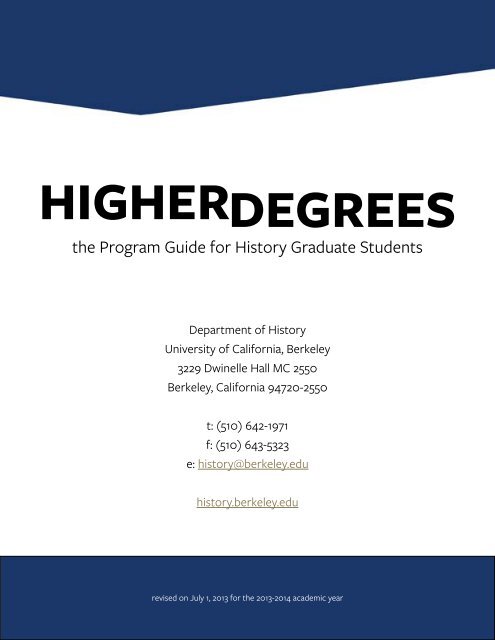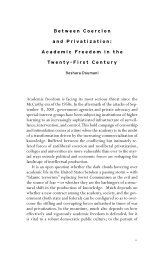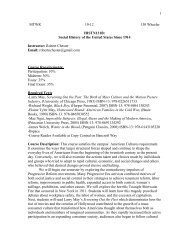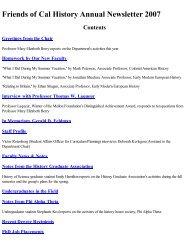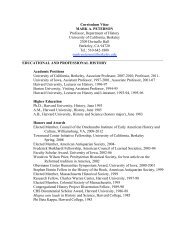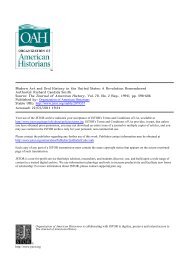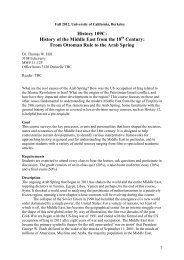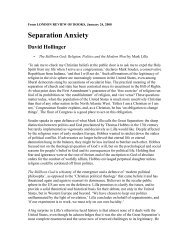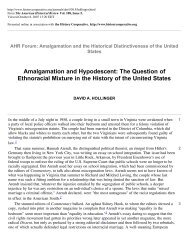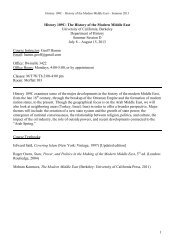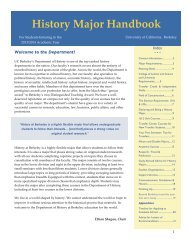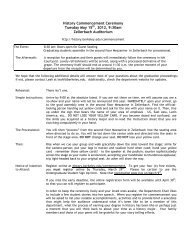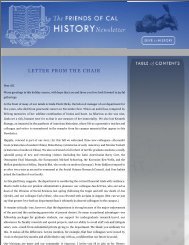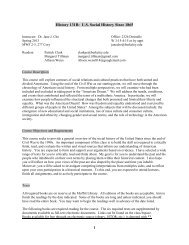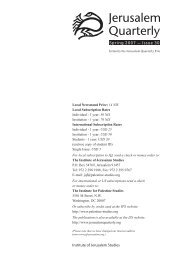Program Guide in PDF Format - Department of History, UC Berkeley
Program Guide in PDF Format - Department of History, UC Berkeley
Program Guide in PDF Format - Department of History, UC Berkeley
- No tags were found...
Create successful ePaper yourself
Turn your PDF publications into a flip-book with our unique Google optimized e-Paper software.
HIGHERDEGREESthe <strong>Program</strong> <strong>Guide</strong> for <strong>History</strong> Graduate Students<strong>Department</strong> <strong>of</strong> <strong>History</strong>University <strong>of</strong> California, <strong>Berkeley</strong>3229 Dw<strong>in</strong>elle Hall MC 2550<strong>Berkeley</strong>, California 94720-2550t: (510) 642-1971f: (510) 643-5323e: history@berkeley.eduhistory.berkeley.edurevised on July 1, 2013 for the 2013-2014 academic year
— 2 —Table <strong>of</strong> ContentsWho should use this guide | who to contact 3Part 1: The <strong>History</strong> PhD <strong>Program</strong> at <strong>Berkeley</strong> 4Introduction | Why study at <strong>Berkeley</strong>? | Apply<strong>in</strong>g (<strong>in</strong> brief) 4Waiv<strong>in</strong>g credits | A special note to change-<strong>of</strong>-major applicants | A special note to new (enter<strong>in</strong>g) 5students: EmpowerU | PhD progress requirements at a glance<strong>Program</strong> fields and options | Select<strong>in</strong>g the two history fields | Select<strong>in</strong>g the third or outside field | 6Length <strong>of</strong> studyMA requirements (en route to the PhD) | PhD coursework requirements 7PhD foreign language requirements | Third semester exam<strong>in</strong>ation 8Third semester progress review | MA degree conferral | Yearly evaluations | PhD qualify<strong>in</strong>g exam<strong>in</strong>ation 9Outcomes | Registration for Directed Dissertation Research | Advanc<strong>in</strong>g to PhD candidacy 10Advanc<strong>in</strong>g to candidacy and the reduction <strong>of</strong> <strong>in</strong>ternational student non-resident tuition | Candidate <strong>in</strong> 11Philosophy (CPhil) degree | Conference attendanceHow and when to file the dissertation | Dissertation fil<strong>in</strong>g | Receiv<strong>in</strong>g a diploma | Fil<strong>in</strong>g fee status | 12Normative time-to-degree | RegistrationIn absentia status | Withdrawal status | Parental leave | Health <strong>in</strong>surance for non-registered students | 13Laps<strong>in</strong>g | Academic job placementCertificate <strong>in</strong> Teach<strong>in</strong>g and Learn<strong>in</strong>g <strong>in</strong> Higher Education | Summer Institute for Prepar<strong>in</strong>g Future Faculty 14Dissertation Completion Support 15Dissertation fellowships | University fellowships | Workshops on secur<strong>in</strong>g outside fund<strong>in</strong>g | Dissertation 15prospectus | Dissertation writ<strong>in</strong>g groups | Chapter-plus colloquiaDissertation presentations | Placement | Deadl<strong>in</strong>es 16Part 2: F<strong>in</strong>ances 17Fees and expenses | International student fees | Budget requirements for visa documents | F<strong>in</strong>ancial 17support | Applicants for admissionEnter<strong>in</strong>g students | Cont<strong>in</strong>u<strong>in</strong>g students | Fund<strong>in</strong>g and change-<strong>of</strong>-major applicants 18Tax credit <strong>in</strong>formation | International students and taxes 19List <strong>of</strong> fund<strong>in</strong>g sources 20Fellowships: <strong>Department</strong>al - University - Extramural | Educational allowance top-<strong>of</strong>fs for external 20fellowships | Graduate Student Employment | Fee remissionGraduate Student Instructorships (GSIships) | English pr<strong>of</strong>iciency exam<strong>in</strong>ation | Readerships 21Graduate Student Research Assistantships (GSRships) | Other: F<strong>in</strong>ancial Aid Office (FAO) - Graduate 22student parentsPart 3: Other Information <strong>of</strong> Interest 23<strong>Department</strong>al appeals procedure | Disabled Students’ <strong>Program</strong> | Non-discrim<strong>in</strong>ation statement 23Appendix I: <strong>History</strong> Graduate Course List 24Appendix II: Language Requirements by Field 25Appendix III: Options for Fulfill<strong>in</strong>g Foreign Language Requirements <strong>in</strong> Most Fields 28Appendix IV: <strong>History</strong> Faculty 29Current faculty 29Adjunct faculty | Emeritus faculty 31Other faculty affiliated with the <strong>History</strong> <strong>Department</strong> 32Appendix V: Interdiscipl<strong>in</strong>ary Studies 33Appendix VI: Forms 34
Who should use this guide?The Higher Degrees program guide has been prepared for two audiences: 1) prospective students <strong>in</strong>terested <strong>in</strong> f<strong>in</strong>d<strong>in</strong>gout about <strong>Berkeley</strong> <strong>History</strong> degree <strong>of</strong>fer<strong>in</strong>gs and 2) current students enrolled <strong>in</strong> our graduate program. Here you can f<strong>in</strong>ddetailed <strong>in</strong>formation about the degree <strong>of</strong>fer<strong>in</strong>gs <strong>in</strong> the department (part 1), about fees and expenses and opportunitiesfor fellowships, f<strong>in</strong>ancial aid, and employment (part 2), and other items <strong>of</strong> <strong>in</strong>terest such as departmental appealsprocedures and appendices perta<strong>in</strong><strong>in</strong>g to courses, language requirements, faculty, <strong>in</strong>terdiscipl<strong>in</strong>ary opportunities, andprogram forms (part 3). Please read carefully and reta<strong>in</strong> your copy for future reference. The <strong>in</strong>formation <strong>in</strong> this guideis subject to modification.Who to contactProspective and newly admitted studentsThe Graduate Admissions, Recruitment, and Outreach Advisor, Er<strong>in</strong> Leigh Inama, is responsible for <strong>in</strong>form<strong>in</strong>gprospective students about degree <strong>of</strong>fer<strong>in</strong>gs and application procedures and policies. She also works with newlyadmitted students dur<strong>in</strong>g the recruitment and acceptance/decl<strong>in</strong>ation process. She can be reached via phone at (510)642-2378 or via email at histadm@berkeley.edu. Her <strong>of</strong>fice is <strong>in</strong> 3312 Dw<strong>in</strong>elle Hall.Current studentsThe Graduate Assistant, Mabel Lee, assists both faculty and students <strong>in</strong> the day-to-day adm<strong>in</strong>istration <strong>of</strong> the graduateprogram. S<strong>in</strong>ce no handbook can answer all questions students may have about the program, students are encouragedto consult regularly with the Graduate Assistant or with their faculty advisor. Forms need<strong>in</strong>g the signature <strong>of</strong> the HeadGraduate Advisor may be submitted to the Graduate Assistant for circulation to the Head Graduate Advisor for signature.Mabel can be reached via phone at (510) 642-2034 or via email at mabel@berkeley.edu. Her <strong>of</strong>fice is <strong>in</strong> 3310 Dw<strong>in</strong>elle Hall.The Head Graduate Advisor chairs the Graduate Advisors Committee and is the department’s <strong>of</strong>ficial faculty liaisonfor the graduate program. Act<strong>in</strong>g <strong>in</strong> this capacity, the Head Graduate Advisor signs all correspondence sent by thedepartment to the Graduate Division, <strong>in</strong>clud<strong>in</strong>g everyth<strong>in</strong>g from rout<strong>in</strong>e petitions, such as Advancement to Candidacyforms, to requests for exceptions to policy. The Head Graduate Advisor can be reached via email at history-gradadvisor@berkeley.edu.The Graduate Advisors Committee (GAC) adm<strong>in</strong>isters the graduate program. First-year students are assigned to agraduate advisor once they arrive at <strong>Berkeley</strong>. First year students must meet with their advisor and/or the Head GraduateAdvisor before the beg<strong>in</strong>n<strong>in</strong>g <strong>of</strong> classes and they are encouraged to confer with their advisor regularly dur<strong>in</strong>g the course<strong>of</strong> their study. Collectively, the GAC considers student petitions, reviews students for cont<strong>in</strong>uation <strong>in</strong> the program,appo<strong>in</strong>ts the Committee <strong>of</strong> Language Exam<strong>in</strong>ers and coord<strong>in</strong>ates that committee’s work, and makes recommendationsconcern<strong>in</strong>g the graduate program to the department.The <strong>History</strong> Graduate Association (HGA) is a student organization established to further the <strong>in</strong>terests <strong>of</strong> all historygraduate students. Each year the HGA elects a council as its representatives. The HGA participates <strong>in</strong> the fall orientation<strong>of</strong> new students and the spr<strong>in</strong>g visit day for admitted students and plans occasional social functions. More importantly,the group discusses, <strong>in</strong>vestigates, and communicates concerns that students may have about the graduate program.The HGA can be reached via email at berkeleyHGA@gmail.com.The Graduate Policy Committee (GPC) is a subcommittee <strong>of</strong> the Graduate Advisors Committee and the <strong>History</strong>Graduate Association and is concerned with graduate program policies. Faculty and student groups or <strong>in</strong>dividuals mayplace proposals, compla<strong>in</strong>ts, or other matters <strong>of</strong> graduate policy on the agenda <strong>of</strong> this jo<strong>in</strong>t faculty-student committee.The recommendations <strong>of</strong> the GPC are submitted to the GAC and then to other appropriate bodies.Students and graduates on the job marketThe Graduate Admissions, Recruitment, and Outreach Advisor is also responsible for help<strong>in</strong>g students and recentgraduates through the job search process. Please f<strong>in</strong>d her contact <strong>in</strong>formation above. Additionally, each year the HeadGraduate Advisor appo<strong>in</strong>ts members <strong>of</strong> the faculty to guide and assist students through the job search process. Er<strong>in</strong> canput you <strong>in</strong> touch with these pr<strong>of</strong>essors.— 3 —
Part 1: The <strong>History</strong> PhD <strong>Program</strong> at <strong>Berkeley</strong>IntroductionThe <strong>Berkeley</strong> <strong>Department</strong> <strong>of</strong> <strong>History</strong> represents a rich spectrum <strong>of</strong> research <strong>in</strong>terests, collaborations, and approachesspann<strong>in</strong>g 16 established fields <strong>of</strong> history: Africa, America S<strong>in</strong>ce 1607, Ancient Greece and Rome, Brita<strong>in</strong>, Byzant<strong>in</strong>e, EarlyModern Europe, East Asia – Ch<strong>in</strong>a, East Asia – Japan, Jewish, Late Modern Europe, Lat<strong>in</strong> America, Medieval, MiddleEast, Science, South Asia, and Southeast Asia. The depth and breadth <strong>of</strong> our program and the strengths <strong>of</strong> our facultymembers, students, and other pr<strong>of</strong>essionals provide an especially stimulat<strong>in</strong>g and congenial sett<strong>in</strong>g for graduate tra<strong>in</strong><strong>in</strong>g.Compris<strong>in</strong>g the department are over 50 full-time faculty members, a number <strong>of</strong> dist<strong>in</strong>guished emeritus faculty andvisit<strong>in</strong>g pr<strong>of</strong>essors, 190 graduate students, and 10 support staff. Our department is the center <strong>of</strong> a history community at<strong>Berkeley</strong> that also <strong>in</strong>cludes faculty, pr<strong>of</strong>essionals, and student colleagues from other departments and campus entitiessuch as the area studies centers, the Townsend Center for the Humanities, the campus archives, and <strong>in</strong>formal studygroups.Why study at <strong>Berkeley</strong>?* The <strong>Berkeley</strong> doctoral program is presently ranked no. 1 <strong>in</strong> the nation, accord<strong>in</strong>g to the most recent US News andWorld Report. We share this dist<strong>in</strong>ction with Pr<strong>in</strong>ceton and Yale.* The department’s faculty has been honored with four MacArthur Foundation “Genius” awards, more than a dozenGuggenheim Fellowships, and a Mellon Foundation Dist<strong>in</strong>guished Achievement Award. The quality <strong>of</strong> our research hasbeen recognized with myriad book prizes and our dedication to teach<strong>in</strong>g and mentor<strong>in</strong>g has also been honored withawards.* In addition to the ma<strong>in</strong> library and the Bancr<strong>of</strong>t (our rare book and manuscript library), there are 11 specialized librarieson campus with more than two dozen special collections and over 10 million volumes. These resources are enhancedby borrow<strong>in</strong>g privileges at Stanford’s libraries and by access to the hold<strong>in</strong>gs <strong>of</strong> the n<strong>in</strong>e other University <strong>of</strong> Californiacampuses. The Bancr<strong>of</strong>t holds over 60 million manuscript items and has particular strengths <strong>in</strong> the history <strong>of</strong> westernNorth America (<strong>in</strong>clud<strong>in</strong>g California, Mexico, and Central America), the history <strong>of</strong> science and technology, major Europeanand American authors (especially the Beat Generation), and the largest collection <strong>of</strong> papyrus documents <strong>in</strong> the westernhemisphere (the Center for the Tebtunis Papyri).* More than 60 ancient and modern languages are taught on the <strong>Berkeley</strong> campus, plac<strong>in</strong>g us among the top fiveuniversities <strong>in</strong> the country <strong>in</strong> terms <strong>of</strong> the breadth <strong>of</strong> our language <strong>of</strong>fer<strong>in</strong>gs. If there is a language you need for yourresearch, you can learn it here.* While pursu<strong>in</strong>g a doctorate <strong>in</strong> history, you can also earn a concurrent PhD <strong>in</strong> Medieval Studies or a designated emphasis<strong>in</strong> areas such as Communication, Computation, and Statistics; Critical Theory; Dutch Studies; Film Studies; Folklore;Global Metropolitan Studies; New Media; Renaissance and Early Modern Studies; and Women, Gender, and Sexuality.* In 2012 and 2013, recent graduates <strong>of</strong> the program have received tenure-track jobs at schools <strong>in</strong>clud<strong>in</strong>g AmericanUniversity <strong>of</strong> Paris, Baruch College, Boston College, Brown University, College <strong>of</strong> Staten Island, Ill<strong>in</strong>ois State University,Mount Holyoke, New York University, Southern Ill<strong>in</strong>ois University, University <strong>of</strong> Colorado, University <strong>of</strong> Colorado - Denver,University <strong>of</strong> Connecticut, University <strong>of</strong> Kansas, University <strong>of</strong> Massachusetts, University <strong>of</strong> Michigan, University <strong>of</strong> SanFrancisco, Wellesley College, Western Wash<strong>in</strong>gton University, University <strong>of</strong> Wiscons<strong>in</strong> - Superior, and, <strong>of</strong> course, righthere at the University <strong>of</strong> California. A number <strong>of</strong> others have received prestigious postdoctoral fellowships such as theAndrew W. Mellon Postdoctoral Fellowship <strong>in</strong> the Humanities.Apply<strong>in</strong>g (<strong>in</strong> brief)The <strong>Berkeley</strong> <strong>History</strong> program admits only the strongest applicants who <strong>in</strong>tend to devote full-time study towardsatta<strong>in</strong><strong>in</strong>g the doctoral degree (PhD) <strong>in</strong> history. We do not <strong>of</strong>fer a stand-alone or term<strong>in</strong>al master’s degree, but studentswho enter the program without an MA <strong>in</strong> history may receive an MA en route to the PhD (more <strong>in</strong>formation about this isprovided below). The department does not grant deferrals to those <strong>of</strong>fered admission, so <strong>in</strong>dividuals should apply onlyfor the academic year <strong>of</strong> <strong>in</strong>tended enrollment.— 4 —
Although most admitted students have an undergraduate major or a master’s <strong>in</strong> history or its equivalent, we acceptapplications from able students who have majored <strong>in</strong> other discipl<strong>in</strong>es but who have acquired the historical backgroundand other skills (e.g., languages) necessary to be competitive with<strong>in</strong> the applicant pool. A master’s degree is not requiredfor admission.On the graduate application, all applicants should <strong>in</strong>dicate their degree goal is the PhD and also <strong>in</strong>dicate their firstfield <strong>of</strong> emphasis from among the “established fields <strong>of</strong> history.” Unlike some programs, our department does notrequire that enter<strong>in</strong>g students be “sponsored by” a s<strong>in</strong>gle faculty member under whose guidance they will proceed <strong>in</strong>the program. Rather, upon entry, a student is encouraged to explore connections and collaborations with a number <strong>of</strong>faculty <strong>in</strong>side and outside their field <strong>of</strong> concentration before settl<strong>in</strong>g on the composition <strong>of</strong> their orals and dissertationcommittees. So that we may anticipate these possible collaborations, we ask applicants to list on the application thosefaculty members whose research is <strong>of</strong> particular <strong>in</strong>terest.To access complete <strong>in</strong>formation about how to apply to the <strong>Berkeley</strong> <strong>History</strong> <strong>Department</strong>, please see our Admissionswebsite at history.berkeley.edu/graduate/admissions/<strong>in</strong>dex.html.Waiv<strong>in</strong>g creditsA student who has completed graduate coursework at another <strong>in</strong>stitution may petition to have typically no more thantwo courses used <strong>in</strong> lieu <strong>of</strong> our PhD course requirements. Syllabi, papers, exam<strong>in</strong>ations, and other clear evidence thatthere is course equivalency should accompany the petition, which must be approved by the Head Graduate Advisor.Courses from another university, if accepted, will be accepted <strong>in</strong>ternally and will not be transferred to the <strong>Berkeley</strong>transcript. Credits used towards fulfillment <strong>of</strong> the MA degree must be <strong>Berkeley</strong> courses, with the exception <strong>of</strong> languagecourses.A special note to change-<strong>of</strong>-major applicantsIf you are or ever were a <strong>Berkeley</strong> graduate student, you are a change-<strong>of</strong>-major applicant. First, you should contact thedepartment to identify yourself. Second, rather than submit an onl<strong>in</strong>e application through <strong>UC</strong> <strong>Berkeley</strong>’s Jazzee system,you will need to submit a paper “Graduate Petition for Change <strong>of</strong> Major or Degree Goal.” Third, you should be aware thatthe Graduate Division starts the normative time clock for all graduate students upon their matriculation at the University.So, for example, if you have spent two years <strong>in</strong> another program, your first year <strong>in</strong> the history doctoral program wouldbe considered your third year by the University for the purposes <strong>of</strong> determ<strong>in</strong><strong>in</strong>g your time to advancement to candidacyfor the PhD and your eligibility for the Dean’s Normative Time Fellowship (DNTF; for those who entered prior to 2010)or for the Doctoral Completion Fellowship (DCF; for those who entered <strong>in</strong> 2010 and after). If you wish to have yournormative time clock reassessed (rolled back one or more semesters), you should petition the Graduate Dean soon afterentry <strong>in</strong>to our program so that you will know how much time you have to advance to doctoral candidacy to qualify forthe DNTF/DCF. (Please refer to the section on F<strong>in</strong>ancial Support to see the potential impact on fund<strong>in</strong>g packages forchange-<strong>of</strong>-majors.)A special note to new (enter<strong>in</strong>g) students: EmpowerUThe University <strong>of</strong> California now requires a violence prevention education session, entitled EmpowerU, for all <strong>in</strong>com<strong>in</strong>gstudents. You have until the end <strong>of</strong> your first semester to complete this. To fulfill the requirement, sign up for a sessionat geneq.berkeley.edu/empoweru.PhD progress requirements at a glanceTypically two graduate courses per semester, taken for a letter grade; progress toward fulfillment <strong>of</strong> at least one foreignlanguage requirement by the end <strong>of</strong> the first year; completion by the first year and <strong>in</strong> the first field <strong>of</strong> any comb<strong>in</strong>ation <strong>of</strong>graduate courses number 275 and 280 and if possible one 285; m<strong>in</strong>imum overall GPA 3.0 and history graduate course GPA3.5; yearly evaluation; pass<strong>in</strong>g <strong>of</strong> the third semester exam<strong>in</strong>ation; fulfillment <strong>of</strong> all course requirements (at least 34 units)and language requirements before tak<strong>in</strong>g the doctoral qualify<strong>in</strong>g exam<strong>in</strong>ation; passage <strong>of</strong> the PhD qualify<strong>in</strong>g exam<strong>in</strong>ation,taken no later than the end <strong>of</strong> the spr<strong>in</strong>g semester <strong>of</strong> the third year for students <strong>in</strong> a six-year field and by the end <strong>of</strong>the spr<strong>in</strong>g semester <strong>of</strong> the fourth year for students <strong>in</strong> a seven-year field; advancement to doctoral candidacy (<strong>in</strong>clud<strong>in</strong>gapproval <strong>of</strong> a dissertation committee and written dissertation prospectus); enrollment <strong>in</strong> Directed Dissertation Research296; after advanc<strong>in</strong>g, submission <strong>of</strong> annual progress reports by doctoral candidates; submission <strong>of</strong> the dissertation bythe end <strong>of</strong> the sixth or seventh year (depend<strong>in</strong>g on field).— 5 —
<strong>Program</strong> fields and optionsThe program prepares the student <strong>in</strong> three selected fields <strong>of</strong> study: two fields <strong>of</strong> history (called the first field and thesecond field) and one field <strong>in</strong> another discipl<strong>in</strong>e (called the third or outside field). Students <strong>in</strong>dicate their choice <strong>of</strong> thefirst field at the time <strong>of</strong> application to the program and they decide upon the second and outside fields by the end <strong>of</strong>the first year <strong>of</strong> study. Students are bound by normative time requirements <strong>of</strong> the first field. The Graduate AdvisorsCommittee must formally approve the selection <strong>of</strong> these fields, normally by the end <strong>of</strong> the first year.Fields1. Africa 9. <strong>History</strong> <strong>of</strong> Science2. America S<strong>in</strong>ce 1607 10. Jewish <strong>History</strong>3. Ancient Greece and Rome* 11. Late Modern Europe4. Brita<strong>in</strong> 12. Lat<strong>in</strong> America5. Byzant<strong>in</strong>e 13. Medieval6. Early Modern Europe 14. Middle East7. East Asia – Ch<strong>in</strong>a 15. South Asia8. East Asia – Japan 16. Southeast Asia* MA students <strong>in</strong> Ancient Greece and Rome def<strong>in</strong>e their field as either Ancient Greece or Ancient Rome; PhD studentsdef<strong>in</strong>e their field as Ancient Greece and Rome or Rome and Late Antiquity.Select<strong>in</strong>g the two history fieldsOption A: Established Fields <strong>of</strong> <strong>History</strong>. A first field and a second field may both be selected from the established fields<strong>of</strong> history.Option B: Thematic focus. With the approval <strong>of</strong> the Graduate Advisors Committee, students may give their second fielda thematic focus, e.g., “Lat<strong>in</strong> American Intellectual <strong>History</strong>,” “U.S. Labor <strong>History</strong>,” etc. The GAC will not approve programs<strong>in</strong> which the first and second fields focus exclusively on a s<strong>in</strong>gle country or region.Option C: Comparative focus. With the approval <strong>of</strong> the Graduate Advisors Committee, students may def<strong>in</strong>e theirsecond field by a topic <strong>of</strong> <strong>in</strong>terest studied <strong>in</strong> a comparative framework. Comparative fields should cover three countriesor regions (one <strong>of</strong> which may be <strong>in</strong>cluded <strong>in</strong> the first field) and should afford a broad geographic and temporal coverage.For exampleFirst FieldSecond FieldAmerica S<strong>in</strong>ce 1607 <strong>History</strong> <strong>of</strong> Religion (US, Italy, and Germany between 1789 and 1945)Lat<strong>in</strong> America Industrial Revolution (Brazil, England, and Japan)Brita<strong>in</strong>Rural <strong>History</strong> (England, Ch<strong>in</strong>a, and the Middle East)Option D: Two equal first fields. Students who wish to emphasize the first and second fields equally must take am<strong>in</strong>imum <strong>of</strong> two graduate sem<strong>in</strong>ars <strong>in</strong> any comb<strong>in</strong>ation <strong>of</strong> 275s and 280s <strong>in</strong> each field and at least one 285 <strong>in</strong> each field.They must also meet the language requirement <strong>in</strong> each field. Their normative time to advancement to candidacy andtime-to-degree rema<strong>in</strong> that <strong>of</strong> the field <strong>of</strong> entrance.Select<strong>in</strong>g the third or outside fieldThe third or outside field for the PhD program must be <strong>in</strong> a discipl<strong>in</strong>e other than history. Students are expected t<strong>of</strong>amiliarize themselves with the literature and methodologies <strong>of</strong> that discipl<strong>in</strong>e and atta<strong>in</strong> detailed knowledge <strong>of</strong> one ormore <strong>of</strong> its specialized areas.Length <strong>of</strong> studyStudents <strong>in</strong> fields with a six-year time-to-degree (mean<strong>in</strong>g they are expected to complete all PhD program requirements<strong>in</strong> six years) can expect to spend three years complet<strong>in</strong>g coursework, one to two years do<strong>in</strong>g dissertation research, andone to two years writ<strong>in</strong>g the dissertation. Fields with a six-year time-to-degree are America S<strong>in</strong>ce 1607, Brita<strong>in</strong>, EarlyModern Europe, <strong>History</strong> <strong>of</strong> Science, Late Modern Europe, Lat<strong>in</strong> America, and Southeast Asia.Students <strong>in</strong> fields with a seven-year time-to-degree (mean<strong>in</strong>g they are expected to complete all PhD program requirements<strong>in</strong> seven years) are given an additional year to complete coursework, given the extensive language preparation required— 6 —
for these fields. Fields with a seven-year time-to-degree are Africa, Ancient Greece and Rome, Byzant<strong>in</strong>e, East Asia –Ch<strong>in</strong>a, East Asia – Japan, Jewish <strong>History</strong>, Medieval Europe, Middle East, and South Asia.MA requirements (en route to the PhD)Students who do not already have a master’s degree <strong>in</strong> history have MA/PhD as their designated degree goal and shouldfile for MA candidacy at the beg<strong>in</strong>n<strong>in</strong>g <strong>of</strong> the term <strong>in</strong> which they will have fulfilled the MA degree requirements as statedbelow. Students who have already received an MA <strong>in</strong> history (or an equivalent discipl<strong>in</strong>e) at <strong>Berkeley</strong> or at another<strong>in</strong>stitution are not eligible to receive a second MA.1. MA coursework (m<strong>in</strong>imum requirements)All coursework counted towards the MA degree must be taken at <strong>Berkeley</strong>.A. 12 units <strong>in</strong> the first field: two graduate sem<strong>in</strong>ars <strong>in</strong> any comb<strong>in</strong>ation <strong>of</strong> 275s and 280s (both must be completed by theend <strong>of</strong> the first year) and one 285 (which should be completed by the end <strong>of</strong> the first year if possible).Students <strong>in</strong> the fields <strong>of</strong> East Asia – Ch<strong>in</strong>a and East Asia – Japan have one additional required 4 unit sem<strong>in</strong>ar. Students<strong>in</strong> East Asia – Ch<strong>in</strong>a must take a read<strong>in</strong>g sem<strong>in</strong>ar (280) or a survey sem<strong>in</strong>ar (275) <strong>in</strong> Japanese history. Students <strong>in</strong> EastAsia – Japan must take a read<strong>in</strong>g or survey sem<strong>in</strong>ar <strong>in</strong> Ch<strong>in</strong>ese history. Exceptions require approval <strong>of</strong> the GraduateAdvisors Committee.Students <strong>in</strong> the field <strong>of</strong> <strong>History</strong> <strong>of</strong> Science must take, <strong>in</strong> addition to other required coursework, the historical colloquium(290) <strong>in</strong> each semester <strong>of</strong> their first two years. The 290 is worth 1 unit and is graded on a S/U basis.B. 12 other course units chosen from any comb<strong>in</strong>ation <strong>of</strong> graduate history courses taken for a letter grade. Toward this12 unit course requirement, students may apply one upper-division undergraduate course <strong>in</strong> history or language and onegraduate course <strong>in</strong> a field other than history (this course may also be used to satisfy the outside field PhD requirement).Students should carefully calculate their units to meet the 24 unit MA requirement, as some upper-division and outsidefield courses are only worth 3 units. It is recommended that students look ahead to the PhD program and select coursesthat will meet their future PhD course requirements.2. LanguageStudents must complete one foreign language from their first field to be eligible for the MA degree. They are advisedto enroll <strong>in</strong> language courses beg<strong>in</strong>n<strong>in</strong>g their first semester. Those who are unable to keep to this timetable shouldconsult with their faculty advisor(s) and devise a plan, as all language requirements must be fulfilled before the PhDqualify<strong>in</strong>g exam at the end <strong>of</strong> the third or fourth year (depend<strong>in</strong>g on field). Please see Appendix II for a list <strong>of</strong> languagerequirements by field and Appendix III for options for fulfill<strong>in</strong>g the language requirements.3. Pass the third semester examPhD coursework requirementsA general course list is available <strong>in</strong> Appendix I. For more course details, see history.berkeley.edu/graduate/courses.Students complete a m<strong>in</strong>imum <strong>of</strong> 34 course units, not <strong>in</strong>clud<strong>in</strong>g language, and ma<strong>in</strong>ta<strong>in</strong> a m<strong>in</strong>imum overall grade po<strong>in</strong>taverage <strong>of</strong> 3.0 (3.5 or above <strong>in</strong> history graduate courses). Courses that are be<strong>in</strong>g applied to the program must be takenfor a letter grade. Students typically take a m<strong>in</strong>imum <strong>of</strong> two graduate courses per semester, plus any additional languagepreparation required by their field. Students hold<strong>in</strong>g a Graduate Student Instructor (GSI) appo<strong>in</strong>tment can opt toreduce their courseload by one graduate course <strong>in</strong> the term <strong>of</strong> the appo<strong>in</strong>tment as long as they are able to complete allcoursework requirements by the prescribed time to advancement to doctoral candidacy for their field. Separate fieldsmay require additional coursework and may also def<strong>in</strong>e the nature <strong>of</strong> the outside field more precisely. With the approval<strong>of</strong> the Graduate Advisors Committee, students may occasionally substitute <strong>History</strong> 299 courses for the required coursesdef<strong>in</strong>ed below. The required coursework is distributed as follows.A. 12 to 16 units <strong>in</strong> the first field: two graduate sem<strong>in</strong>ars <strong>in</strong> any comb<strong>in</strong>ation <strong>of</strong> 275s and 280s (both must be completedby the end <strong>of</strong> the first year) and two 285s (one should be completed by the end <strong>of</strong> the first year if possible).— 7 —
Students <strong>in</strong> the fields <strong>of</strong> East Asia – Ch<strong>in</strong>a and East Asia – Japan have one additional required 4 unit sem<strong>in</strong>ar. Students<strong>in</strong> East Asia – Ch<strong>in</strong>a must take a read<strong>in</strong>g sem<strong>in</strong>ar (280) or a survey sem<strong>in</strong>ar (275) <strong>in</strong> Japanese history. Students <strong>in</strong> EastAsia – Japan must take a read<strong>in</strong>g or survey sem<strong>in</strong>ar <strong>in</strong> Ch<strong>in</strong>ese history. Exceptions require approval <strong>of</strong> the GraduateAdvisors Committee.Students <strong>in</strong> the field <strong>of</strong> <strong>History</strong> <strong>of</strong> Science must take, <strong>in</strong> addition to other required coursework, the historical colloquium(290) <strong>in</strong> each semester <strong>of</strong> their first two years. The 290 is worth 1 unit and is graded on a S/U basis.B. 8 to 12 units <strong>in</strong> the second field: two graduate sem<strong>in</strong>ars <strong>in</strong> any comb<strong>in</strong>ation <strong>of</strong> 275s and 280s or one 285 and eitherone 275 or one 280. Students with equal first and second fields must take a m<strong>in</strong>imum <strong>of</strong> two graduate sem<strong>in</strong>ars <strong>in</strong> anycomb<strong>in</strong>ation <strong>of</strong> 275s and 280s <strong>in</strong> each field and at least one 285 <strong>in</strong> each field. Students choos<strong>in</strong>g this option must meetthe language requirement <strong>in</strong> each field.C. 3 to 4 units <strong>in</strong> the third field: one graded course <strong>in</strong> a field and department other than history.D. 4 units <strong>of</strong> methodology: Historical Method and Theory (283). Students are strongly encouraged to take this course<strong>in</strong> their first or second year.E. 2 units <strong>of</strong> pedagogy: Teach<strong>in</strong>g <strong>History</strong> Pedagogy Sem<strong>in</strong>ar (formerly 300, now 375). A pedagogy course is required <strong>of</strong>all first-time Graduate Student Instructors (GSIs). Students are strongly encouraged to take the <strong>Department</strong> <strong>of</strong> <strong>History</strong>’s375, which is <strong>of</strong>fered <strong>in</strong> the fall semester only.PhD foreign language requirementsThe language requirements for the PhD vary by field between one and four. Students whose field requires two or morelanguages are advised to come to the program with significant preparation <strong>in</strong> the languages most critical to the field(e.g., students <strong>in</strong> medieval history should have <strong>in</strong>termediate Lat<strong>in</strong> at the time <strong>of</strong> application). Students should attemptto complete one foreign language applicable to the selected field by the end <strong>of</strong> the first year. Please see Appendix II fora list <strong>of</strong> language requirements by field and Appendix III for options for fulfill<strong>in</strong>g the language requirements. Studentsmust satisfy all language requirements before tak<strong>in</strong>g the doctoral qualify<strong>in</strong>g exam<strong>in</strong>ation. Faculty <strong>in</strong> the field can helpstudents make a plan for complet<strong>in</strong>g the requirements.Third semester exam<strong>in</strong>ationIn the third semester, all students are exam<strong>in</strong>ed for general command <strong>of</strong> the history and scholarship <strong>in</strong> their first field.Students tak<strong>in</strong>g the exam will be expected to display, at m<strong>in</strong>imum, textbook-level knowledge <strong>of</strong> their fields and/or athorough mastery <strong>of</strong> the materials covered <strong>in</strong> the courses they have taken at <strong>Berkeley</strong>. A m<strong>in</strong>imum program <strong>of</strong> threesem<strong>in</strong>ars or its equivalent (275s, 280s, and/or 285s), two <strong>of</strong> which must be <strong>in</strong> the first field, is a prerequisite to theexam<strong>in</strong>ation. Exam<strong>in</strong>ations may be oral or written or both (depend<strong>in</strong>g on the field) and are graded pass/fail. TheGraduate Advisors Committee appo<strong>in</strong>ts third semester exam committees, consist<strong>in</strong>g <strong>of</strong> three faculty members andchaired by a member <strong>of</strong> the GAC. The exam committees draft and grade the written exam<strong>in</strong>ations, adm<strong>in</strong>ister the oralexam<strong>in</strong>ations, and report the results to the GAC.Fields with oral third semester exam<strong>in</strong>ations: Africa, America S<strong>in</strong>ce 1607, Brita<strong>in</strong>, Early Modern Europe, Jewish<strong>History</strong>, Late Modern Europe, Lat<strong>in</strong> America, South Asia, and Southeast Asia.The oral exam<strong>in</strong>ations are approximately one hour long.Fields with written third semester exam<strong>in</strong>ations: Ancient Greece and Rome, Byzant<strong>in</strong>e, East Asia – Ch<strong>in</strong>a*, East Asia– Japan*, <strong>History</strong> <strong>of</strong> Science**, and Middle East.Except for the two East Asian fields and <strong>History</strong> <strong>of</strong> Science, written exams are three hours long and are closed book.* The third semester exam<strong>in</strong>ation <strong>in</strong> East Asian history is a three-hour written exam designed to test the candidate’sknowledge <strong>of</strong> both Ch<strong>in</strong>ese and Japanese history. It consists <strong>of</strong> five sections, three <strong>of</strong> them deal<strong>in</strong>g with Ch<strong>in</strong>ese history(Early Ch<strong>in</strong>a, the Middle Period, and Modern Ch<strong>in</strong>a) and two with Japanese history (pre-1600 Japan and post-1600Japan). Each section <strong>of</strong>fers a choice <strong>of</strong> two essay questions so that a total <strong>of</strong> ten questions is posed. Students mustanswer two questions total, one about Ch<strong>in</strong>ese history and one about Japanese history. The exam<strong>in</strong>ation is open-bookand adm<strong>in</strong>istered via computer. Questions will be emailed to the students at their campus email address at 9:00am on— 8 —
and coursework must be fulfilled and all <strong>in</strong>completes removed before tak<strong>in</strong>g the exam<strong>in</strong>ation. In plann<strong>in</strong>g for theirqualify<strong>in</strong>g exam, students should consult with their proposed committee members to make certa<strong>in</strong> they will be availableto participate. Students should notify the Graduate Assistant by complet<strong>in</strong>g the departmental form “Constitution <strong>of</strong> thePhD Oral Qualify<strong>in</strong>g Exam Committee.” This form should be submitted at least two months <strong>in</strong> advance <strong>of</strong> the proposedexam<strong>in</strong>ation date; exceptions to this require the approval <strong>of</strong> the Graduate Advisors Committee. There is an additionalGraduate Division form, the “Application for the Qualify<strong>in</strong>g Exam<strong>in</strong>ation,” that must be submitted to Graduate Division atleast three weeks <strong>in</strong> advance <strong>of</strong> the orals date. There are no exceptions to the Graduate Division deadl<strong>in</strong>e. This meansthat any petition for an exception to the committee composition must be approved before the application can be sentto Graduate Division.The exam committee is composed <strong>of</strong> two history faculty members who will exam<strong>in</strong>e <strong>in</strong> the first field, two history facultymembers who will exam<strong>in</strong>e <strong>in</strong> the second field, and a faculty member from another department who will exam<strong>in</strong>e <strong>in</strong>the outside field. A first field pr<strong>of</strong>essor who is not the student’s proposed dissertation advisor will normally chair thecommittee. The chair and outside member must be members <strong>of</strong> the <strong>Berkeley</strong> Division <strong>of</strong> the Academic Senate (tenuredor tenure-track faculty). Please be sure to check that these two pr<strong>of</strong>essors meet this requirement. The GAC and theDean <strong>of</strong> the Graduate Division must formally approve the composition <strong>of</strong> the exam committee.The exam tests the candidate’s mastery <strong>of</strong> the factual <strong>in</strong>formation and theoretical concepts absorbed through courseworkand sem<strong>in</strong>ar research <strong>in</strong> the three fields approved for the doctoral program. It also assesses the candidate’s read<strong>in</strong>essto enter the dissertation research phase <strong>of</strong> the program.The exam is oral and lasts between two and three hours. As a general rule, each exam<strong>in</strong>er has twenty m<strong>in</strong>utes to askquestions. A shorter follow-up round is possible after each exam<strong>in</strong>er has had his/her twenty m<strong>in</strong>utes. The oral exammay also, at the student’s option, have a written component. Two weeks prior to the oral exam, students who choosethe written option will be <strong>of</strong>fered three topics <strong>in</strong> each <strong>of</strong> the two history fields. The candidate will select one topic <strong>in</strong>each field as the subject <strong>of</strong> an essay <strong>of</strong> the approximate scope <strong>of</strong> an upper-division undergraduate lecture and will begiven a week to write the essays, us<strong>in</strong>g any reference material or other resources desired. The exam committee will thenread the two essays and, as part <strong>of</strong> the oral exam, ask the candidate to discuss and defend the ideas presented there<strong>in</strong>.This written component is an <strong>in</strong>tegral part <strong>of</strong> the PhD exam<strong>in</strong>ation and not a separate test to be passed or failed alone.Students who choose this option must consult with their faculty advisor and exam<strong>in</strong>ers <strong>in</strong> the two history fields and then<strong>in</strong>form the Graduate Assistant no later than five weeks prior to the date <strong>of</strong> the oral exam. A copy <strong>of</strong> each essay will beplaced <strong>in</strong> the student’s folder at the time <strong>of</strong> the PhD exam.OutcomesAt the conclusion <strong>of</strong> the PhD oral qualify<strong>in</strong>g exam, the committee may advise the Dean <strong>of</strong> the Graduate Division thatthe student has either a) passed the exam and should be cont<strong>in</strong>ued <strong>in</strong> the program, b) failed the exam but should bere-exam<strong>in</strong>ed after at least three months have passed, or c) failed the exam and should be discont<strong>in</strong>ued without reexam<strong>in</strong>ation.Registration for Directed Dissertation ResearchAfter pass<strong>in</strong>g the PhD oral qualify<strong>in</strong>g exam<strong>in</strong>ation, unless they are on approved withdrawal status, students register for<strong>History</strong> 296: Directed Dissertation Research until the dissertation is completed and filed with the Graduate Division.Advanc<strong>in</strong>g to PhD candidacyIn order to advance to PhD candidacy, the student must a) pass the qualify<strong>in</strong>g exam, b) obta<strong>in</strong> approval from theGraduate Advisors Committee for the composition <strong>of</strong> their dissertation committee (consist<strong>in</strong>g <strong>of</strong> two members fromthe history department and one member from another department), and c) present the dissertation committee awritten dissertation prospectus. After the committee has met with the student and approved the prospectus, thestudent will submit the “Application for Candidacy for the Doctoral Degree” form to the Graduate Division for formalapproval.Human subjects and animal protocol: If your research project <strong>in</strong>volves human subjects (<strong>in</strong>clud<strong>in</strong>g <strong>in</strong>terviews), you musttake the onl<strong>in</strong>e Collaborative IRB Tra<strong>in</strong><strong>in</strong>g Initiative (CITI) course and pr<strong>in</strong>t out the certification <strong>of</strong> completion before youcan submit the paperwork to advance. If your project <strong>in</strong>volves vertebrate animals, you must obta<strong>in</strong> prior approval fromthe Animal Use and Care Committee and the Graduate Division.— 10 —
Students should aim to advance <strong>in</strong> strict accordance with the timetables outl<strong>in</strong>ed below <strong>in</strong> section A or B (as applicable)<strong>in</strong> order to qualify for the Dean’s Normative Time Fellowship (DNTF; for those who entered prior to 2010) or for theDoctoral Completion Fellowship (DCF; for those who entered <strong>in</strong> 2010 and after).A. This section applies only to students who entered before Fall 2010Advanc<strong>in</strong>g to PhD candidacy and the Dean’s Normative Time Fellowship (DNTF). For students who entered prior to2010, the Graduate Division awards a Dean’s Normative Time Fellowship (DNTF) consist<strong>in</strong>g <strong>of</strong> two semesters <strong>of</strong> stipendand fees to students who advance to PhD candidacy with<strong>in</strong> the normative time established for their field. Students <strong>in</strong> sixyeartime-to-degree fields are awarded the DNTF provided that the doctoral qualify<strong>in</strong>g exam is passed by the end <strong>of</strong> thespr<strong>in</strong>g semester and advancement is completed by June 30 <strong>of</strong> their third year. Students <strong>in</strong> seven-year time-to-degreefields are awarded the DNTF provided that the doctoral qualify<strong>in</strong>g exam is passed by the end <strong>of</strong> the spr<strong>in</strong>g semester andadvancement is completed by June 30 <strong>of</strong> their fourth year. Students who entered <strong>in</strong> 2007, 2008, and 2009 will normallyuse the DNTF dur<strong>in</strong>g their research year, which is the year immediately follow<strong>in</strong>g their orals; the DNTF can be deferredto a later year if the student obta<strong>in</strong>s other sources <strong>of</strong> fund<strong>in</strong>g for the research year. In either case, students must usetheir DNTF with<strong>in</strong> normative time.B. This section applies only to students who entered <strong>in</strong> Fall 2010 and afterAdvanc<strong>in</strong>g to PhD candidacy and the Doctoral Completion Fellowship (DCF). For students who entered <strong>in</strong> 2010 or after,the Graduate Division awards a Doctoral Completion Fellowship (DCF) consist<strong>in</strong>g <strong>of</strong> two semesters <strong>of</strong> stipend and feesto students who submit a progress report and advance to PhD candidacy with<strong>in</strong> the normative time established for theirfield. Students <strong>in</strong> six-year time-to-degree fields are awarded the DCF provided that the doctoral qualify<strong>in</strong>g exam is passedby the end <strong>of</strong> the spr<strong>in</strong>g semester and advancement is completed by June 30 <strong>of</strong> their third year. Students <strong>in</strong> seven-yeartime-to-degree fields are awarded the DCF provided that the doctoral qualify<strong>in</strong>g exam is passed by the end <strong>of</strong> the spr<strong>in</strong>gsemester and advancement is completed by June 30 <strong>of</strong> their fourth year. Students will normally use the DCF dur<strong>in</strong>g theirresearch year, which is the year immediately follow<strong>in</strong>g their orals; the DCF can be deferred to a later year if the studentobta<strong>in</strong>s other sources <strong>of</strong> fund<strong>in</strong>g for the research year. In either case, students must use their DCF with<strong>in</strong> four years <strong>of</strong>advanc<strong>in</strong>g to candidacy. Students who receive the DCF are not eligible for any further university employment or fund<strong>in</strong>g(except loans) after one year past their normative time-to-degree (NTD + 1). International students who wait to use theDCF <strong>in</strong> Year NTD + 1 will be expected to pay non-resident student tuition for that year.Note: The DNTF and the DCF may be supplemented by only a s<strong>in</strong>gle one-semester appo<strong>in</strong>tment as a GSI, GSI/Act<strong>in</strong>gInstructor, GSR, reader, or tutor and for no greater than 25% time (10 hours per week). For students who are eligible fortwo semesters <strong>of</strong> DNTF or DCF, the 25% time appo<strong>in</strong>tment may be taken <strong>in</strong> only one <strong>of</strong> the two semesters.Advanc<strong>in</strong>g to candidacy and the reduction <strong>of</strong> <strong>in</strong>ternational student non-resident tuitionInternational students are eligible for a 100% reduction <strong>in</strong> non-resident tuition for three consecutive years from the datethey advance to PhD candidacy, whether registered or not. Any such student who cont<strong>in</strong>ues to register after receiv<strong>in</strong>gthe reduction for three years will be charged the full non-resident tuition rate effective at that time. Advancement doesnot reduce <strong>in</strong>-state fees.Candidate <strong>in</strong> Philosophy (CPhil) degreeDoctoral candidates who wish to receive a Candidate <strong>in</strong> Philosophy (CPhil) degree, which gives formal recognition to thecompletion <strong>of</strong> all requirements for the PhD except the dissertation, must notify the Graduate Assistant before the end<strong>of</strong> the fifth week follow<strong>in</strong>g the semester <strong>of</strong> advancement.Conference attendanceIt is expected that doctoral students will participate <strong>in</strong> pr<strong>of</strong>essional conferences as part <strong>of</strong> their necessary job marketpreparations. The department and the University support and facilitate this expectation <strong>in</strong> a number <strong>of</strong> ways, forexample through faculty guidance, release time from expected course attendance and other obligations, and fund<strong>in</strong>g.For more <strong>in</strong>formation about fund<strong>in</strong>g opportunities available on campus to support conference attendance, please seegrad.berkeley.edu/f<strong>in</strong>ancial/pdf/travel_grants.pdf and ga.berkeley.edu/fund<strong>in</strong>g/travel-grants.— 11 —
How and when to file the dissertationA booklet <strong>of</strong> <strong>in</strong>structions on prepar<strong>in</strong>g and submitt<strong>in</strong>g a dissertation is available onl<strong>in</strong>e at grad.berkeley.edu/policies/guides/dissertation-fil<strong>in</strong>g. All dissertations are now submitted digitally. The booklet specifies formatt<strong>in</strong>g requirements,fil<strong>in</strong>g procedures, and copyright <strong>in</strong>formation. With digital fil<strong>in</strong>g, your dissertation will be freely available via the library’swebsite two years after the fil<strong>in</strong>g date unless you request a longer withhold<strong>in</strong>g period on the “Dissertation ReleaseForm.” Students are strongly advised to discuss with their dissertation chairs withhold<strong>in</strong>g access for five years to protectresearch, particularly <strong>in</strong> archival sources, until published <strong>in</strong> monograph form. Students complet<strong>in</strong>g requirements for afall degree must file their dissertation with the Graduate Division by the last work<strong>in</strong>g day <strong>of</strong> the fall semester; studentscomplet<strong>in</strong>g requirements for a spr<strong>in</strong>g degree must file by the last work<strong>in</strong>g day <strong>of</strong> the spr<strong>in</strong>g semester (specific deadl<strong>in</strong>edates are available at the beg<strong>in</strong>n<strong>in</strong>g <strong>of</strong> the academic year). It is strongly recommended that a copy <strong>of</strong> the f<strong>in</strong>al draft <strong>of</strong>one’s dissertation be given to each dissertation committee member.Dissertation fil<strong>in</strong>gStudents must be on approved fil<strong>in</strong>g fee status or be registered <strong>in</strong> the term the dissertation is filed. Students register<strong>in</strong>g<strong>in</strong> the summer must enroll <strong>in</strong> at least three units dur<strong>in</strong>g any <strong>of</strong> the sessions (A, B, C, D, or E) and have until the end <strong>of</strong> thatsession to file; the degree itself will be conferred the follow<strong>in</strong>g fall.Receiv<strong>in</strong>g a diplomaGraduat<strong>in</strong>g students must update their address on BearFacts so that the Registrar’s Office can send them their diplomaby postal mail. Please be sure that the section you update is the diploma section <strong>of</strong> the directory.Fil<strong>in</strong>g fee statusThe fil<strong>in</strong>g fee permits eligible doctoral students to pay one-half the student services fee (or approximately $250) <strong>in</strong> lieu<strong>of</strong> full registration fees the semester they <strong>in</strong>tend to submit their dissertations. Students must apply to the GraduateDivision for this status and it is approved only for students who have been cont<strong>in</strong>uously enrolled dur<strong>in</strong>g all periods <strong>of</strong>study and research that have required the use University facilities or faculty consultation and who were registered theprevious semester. Students must apply for the fil<strong>in</strong>g fee before the beg<strong>in</strong>n<strong>in</strong>g <strong>of</strong> the semester <strong>in</strong> which they <strong>in</strong>tendto submit their dissertations. Fil<strong>in</strong>g fee status is not equivalent to registration (students may not take coursework oruse any University facilities not accorded the general public) and is approved only once for eligible students. If they donot complete f<strong>in</strong>al degree requirements by the end <strong>of</strong> the term, students must register and pay regular fees dur<strong>in</strong>g thesemester <strong>in</strong> which they do complete those requirements. Students on approved fil<strong>in</strong>g fee status can purchase health<strong>in</strong>surance and a library card with a memo from the Graduate Assistant.Normative time-to-degreeThe normative or expected time-to-degree <strong>of</strong> a history PhD candidate is six or seven years, depend<strong>in</strong>g on the first field, asdeclared upon admission to the program. Students <strong>in</strong> fields <strong>in</strong> which the language requirement can be fulfilled with<strong>in</strong> thefirst three years are expected to complete their coursework and language requirements, pass their orals, and advanceto PhD candidacy <strong>in</strong> three years and to research and write the dissertation <strong>in</strong> an additional three years, for a total <strong>of</strong> sixyears to obta<strong>in</strong> the degree. Students whose fields demand extensive language tra<strong>in</strong><strong>in</strong>g have four years to advance to PhDcandidacy and an additional three years to research and write the dissertation, for a total <strong>of</strong> seven years to obta<strong>in</strong> thedegree. Failure to complete the qualify<strong>in</strong>g exam and advance to candidacy with<strong>in</strong> normative time has serious f<strong>in</strong>ancialconsequences, <strong>in</strong>clud<strong>in</strong>g loss <strong>of</strong> departmental and University aid. Unless on approved withdrawal status, students mustregister until they complete all requirements for the PhD degree.Fields with a six-year time-to-degree: America S<strong>in</strong>ce 1607, Brita<strong>in</strong>, Early Modern Europe, <strong>History</strong> <strong>of</strong> Science, LateModern Europe, Lat<strong>in</strong> America, and Southeast Asia.Fields with a seven-year time-to-degree: Africa, Ancient Greece and Rome, Byzant<strong>in</strong>e, East Asia – Ch<strong>in</strong>a, East Asia –Japan, Jewish <strong>History</strong>, Medieval Europe, Middle East, and South Asia.RegistrationStudents are required to register throughout their graduate student careers. The only exceptions are those semestersdur<strong>in</strong>g which they <strong>of</strong>ficially withdraw from the University or are on fil<strong>in</strong>g fee status. Students may not register and enrollafter the award <strong>of</strong> the degree for which they are admitted unless they have been approved for a new degree goal or— 12 —
major. Students are expected to register full-time <strong>in</strong> each semester (12 graduate units or the equivalent).In absentia statusIn absentia status is a form <strong>of</strong> registration available to graduate students who are advanced to doctoral candidacy andundertak<strong>in</strong>g research (related to their degree program) outside <strong>of</strong> California for an entire semester. Students registered<strong>in</strong> absentia are only assessed health <strong>in</strong>surance fees (approximately $1150 per semester) and 15% <strong>of</strong> the comb<strong>in</strong>ed tuitionand student services fees (approximately $915 per semester). Applications are due by July 15 for the fall semester andDecember 9 for the spr<strong>in</strong>g semester. Students may hold University fellowships and GSR appo<strong>in</strong>tments dur<strong>in</strong>g the <strong>in</strong>absentia period (but may not hold GSI, reader, or tutor appo<strong>in</strong>tments). Upon approval <strong>of</strong> the Graduate Dean, studentsmay use <strong>in</strong> absentia status for a maximum <strong>of</strong> four semesters.Withdrawal statusUnless on approved withdrawal status, students must register until they complete all requirements for the PhD degree.Those with outstand<strong>in</strong>g loans should consult with their lender regard<strong>in</strong>g deferment <strong>of</strong> loan payments. Internationalstudents should consult with the <strong>Berkeley</strong> International Office (BIO) about ma<strong>in</strong>ta<strong>in</strong><strong>in</strong>g visa status while withdrawn.Students withdraw by cancell<strong>in</strong>g their registration for the follow<strong>in</strong>g term through TeleBears. Students rema<strong>in</strong> onwithdrawn status until they apply for readmission. Email addresses <strong>of</strong> withdrawn students rema<strong>in</strong> active for 274 daysbefore expir<strong>in</strong>g; students anticipat<strong>in</strong>g rema<strong>in</strong><strong>in</strong>g withdrawn for longer than 274 days can arrange to have their accessextended for up to two years but must arrange to withdraw through the Graduate Assistant <strong>in</strong>stead <strong>of</strong> TeleBears.Withdrawn students can purchase a library card with a memo from the Graduate Assistant.Parental leaveIn recognition <strong>of</strong> the physical demands <strong>of</strong> childbear<strong>in</strong>g, a woman anticipat<strong>in</strong>g childbirth is entitled to receive an extension<strong>of</strong> up to one extra year for pass<strong>in</strong>g prelim<strong>in</strong>ary exam<strong>in</strong>ations and qualify<strong>in</strong>g exam<strong>in</strong>ations and an extension <strong>of</strong> up to oneextra year toward normative time completion while <strong>in</strong> candidacy. A woman or man experienc<strong>in</strong>g other extraord<strong>in</strong>aryparent<strong>in</strong>g demands, such as the serious illness <strong>of</strong> a child, is entitled to receive an extension <strong>of</strong> up to six extra monthsfor pass<strong>in</strong>g prelim<strong>in</strong>ary exam<strong>in</strong>ations and qualify<strong>in</strong>g exam<strong>in</strong>ations and an extension <strong>of</strong> up to six extra months towardsnormative time completion while <strong>in</strong> candidacy. However, the total additional time granted by this policy cannot exceedtwo years, no matter how many children are <strong>in</strong>volved. The Head Graduate Advisor’s endorsement is required when therequest is sent to the Graduate Division for review.Health <strong>in</strong>surance for non-registered studentsNon-registered <strong>UC</strong> <strong>Berkeley</strong> students on approved fil<strong>in</strong>g fee or withdrawal status can voluntarily enroll <strong>in</strong> SHIP (the StudentHealth Insurance Plan) for a maximum <strong>of</strong> two semesters. The student must have been covered by the plan immediatelypreced<strong>in</strong>g the term for which s/he wants to purchase coverage. Voluntary non-registered student enrollment must becompleted with<strong>in</strong> the enrollment period. The enrollment period for the fall semester is July 15 to September 15 and theenrollment period for the spr<strong>in</strong>g semester is December 15 through February 15.Laps<strong>in</strong>gStudents who do not complete requirements for the degree with<strong>in</strong> five years after advanc<strong>in</strong>g to doctoral candidacywill have their candidacy lapsed by the Graduate Division. Students have the opportunity to request an extension <strong>of</strong>candidacy for up to one year. Laps<strong>in</strong>g is a probationary status that usually lasts two years. Lapsed students can requestre<strong>in</strong>statement at the time a complete draft is submitted to his/her committee if previously completed requirements,such as coursework, languages, and qualify<strong>in</strong>g exam, are still valid. The Dean <strong>of</strong> the Graduate Division reviews requestsfor re<strong>in</strong>statement.Academic job placement<strong>History</strong> graduate students should beg<strong>in</strong> prepar<strong>in</strong>g for the academic job market the spr<strong>in</strong>g semester prior to the academicyear <strong>in</strong> which they will beg<strong>in</strong> to apply for jobs (which will start the follow<strong>in</strong>g academic year). Students should plan tohave at least two dissertation chapters done by the time they start to apply and they should be prepared to file beforethey start a job. The department provides resources to facilitate the process, <strong>in</strong>clud<strong>in</strong>g a series <strong>of</strong> workshops (<strong>in</strong> May,September, and December) on prepar<strong>in</strong>g for the job market and one-on-one advis<strong>in</strong>g by faculty and staff. The <strong>Berkeley</strong>Career Center also <strong>of</strong>fers assistance <strong>in</strong> jo<strong>in</strong><strong>in</strong>g the job market. For more <strong>in</strong>formation on Career Center resources, please— 13 —
see career.berkeley.edu/PhDs/PhDs.stm.Certificate <strong>in</strong> Teach<strong>in</strong>g and Learn<strong>in</strong>g <strong>in</strong> Higher EducationBeg<strong>in</strong>n<strong>in</strong>g fall 2012, the Graduate Student Instructor Teach<strong>in</strong>g and Resource Center will be <strong>of</strong>fer<strong>in</strong>g a Certificate <strong>in</strong>Teach<strong>in</strong>g and Learn<strong>in</strong>g <strong>in</strong> Higher Education. The department strongly encourages all students <strong>in</strong>terested <strong>in</strong> teach<strong>in</strong>g toapply and participate. For more <strong>in</strong>formation, please see gsi.berkeley.edu/certificate/<strong>in</strong>dex.html.Summer Institute for Prepar<strong>in</strong>g Future FacultyThe Center also <strong>of</strong>fers a Summer Institute for Prepar<strong>in</strong>g Future Faculty, geared towards students who have alreadyadvanced to candidacy. Past history students who have gone through the program highly recommend it. Admission iscompetitive and the deadl<strong>in</strong>e is usually <strong>in</strong> mid-March. For more <strong>in</strong>formation, please see gsi.berkeley.edu/conf_wkshop/SummerInstitute<strong>Guide</strong>l<strong>in</strong>es.html.— 14 —
— 15 —Dissertation completion supportThe department and the University <strong>of</strong>fer a wide variety <strong>of</strong> resources to aid <strong>in</strong> the completion <strong>of</strong> your doctoral dissertation.In pursuit <strong>of</strong> primary source material necessary for their orig<strong>in</strong>al dissertation research, students may be expected totravel some distance from campus. Even students who are able to complete all research locally can require extra fund<strong>in</strong>gsupport. In recognition <strong>of</strong> this, the department and the University <strong>of</strong>fer research- and writ<strong>in</strong>g- specific fund<strong>in</strong>g support.Students should also apply, <strong>in</strong> consultation with their faculty mentors, for national and <strong>in</strong>ternational fellowships thatfacilitate research at archives and libraries with<strong>in</strong> the US and abroad.Dissertation fellowshipsEach year, the department awards (on a competitive basis) a limited number <strong>of</strong> “write up” fellowships. The fellowshipprovides relief from teach<strong>in</strong>g, allow<strong>in</strong>g students to focus entirely on writ<strong>in</strong>g. Students receive a stipend <strong>of</strong> $10,000 eachsemester, plus all fees <strong>in</strong> the fall semester and the fil<strong>in</strong>g and health <strong>in</strong>surance fees <strong>in</strong> the spr<strong>in</strong>g semester.University fellowshipsThe department also nom<strong>in</strong>ates students for three competitive University research fellowships: the University <strong>of</strong> CaliforniaDissertation Fellowship, the Chancellor’s Dissertation Fellowship, and the Mentored Research Award. Information onthese fellowships, as well as other campus grants, is available at grad.berkeley.edu/f<strong>in</strong>ancial/deadl<strong>in</strong>es.shtml (option 3 -“Other <strong>UC</strong> <strong>Berkeley</strong> Awards <strong>Program</strong>s”).Factored <strong>in</strong>to the department’s standard five-year fellowships are the Dean’s Normative Time Fellowship (DNTF; forstudents admitted prior to 2010) and the Dissertation Completion Fellowship (DCF; for students admitted <strong>in</strong> 2010 andafter). These fellowships provide a two-semester stipend plus fees. For more <strong>in</strong>formation, please see grad.berkeley.edu/f<strong>in</strong>ancial/deadl<strong>in</strong>es.shtml (option 2 - “Fellowships Adm<strong>in</strong>istered by the Graduate Division”). Students accept<strong>in</strong>g the DCFshould note that they will receive no further University fund<strong>in</strong>g (except loans) after reach<strong>in</strong>g one year beyond normativetime.Workshops on secur<strong>in</strong>g outside fund<strong>in</strong>gThe Head Graduate Advisor <strong>of</strong>fers regular workshops on apply<strong>in</strong>g for extramural fellowships and writ<strong>in</strong>g successfulproposals specifically geared to historical research and fund<strong>in</strong>g sources. The Graduate Division also regularly <strong>of</strong>fersgeneral workshops on writ<strong>in</strong>g academic grant proposals as well as sessions on apply<strong>in</strong>g to specific programs (e.g., theFulbright).Dissertation prospectusOur program requires students to submit a dissertation prospectus (or proposal) <strong>in</strong> order to advance to candidacy.Generally, the prospectus should describe the issue or problem the dissertation will address and <strong>in</strong>clude a discussion<strong>of</strong> relevant historiography, a description <strong>of</strong> the sources and methods to be used, and a plan <strong>of</strong> research. Each studentshould discuss the precise form and content <strong>of</strong> the prospectus with his or her <strong>in</strong>tended dissertation chair (also called thefirst reader). The chair and other members <strong>of</strong> the dissertation committee must evaluate and approve the prospectusbefore the student is advanced to candidacy.Dissertation writ<strong>in</strong>g groupsThe <strong>History</strong> Graduate Association (HGA) partners will the department to help organize and support dissertation writ<strong>in</strong>ggroups. The consensus among graduate students <strong>in</strong> the department has been that students should decide with whomthey will share their work <strong>in</strong> progress and whose commentary would best support and encourage them <strong>in</strong> the process <strong>of</strong>dissertation writ<strong>in</strong>g. The formation <strong>of</strong> writ<strong>in</strong>g groups is strongly encouraged and to that end the department chair is ableto <strong>of</strong>fer small amounts <strong>of</strong> fund<strong>in</strong>g for refreshments or other <strong>in</strong>cidental expenses. Groups are additionally encouraged to<strong>in</strong>vite faculty members to participate <strong>in</strong> their sessions.Chapter-plus colloquiaA challenge <strong>of</strong>ten faced by history graduate students is that they conceive a project at the prospectus stage but thenwhat they f<strong>in</strong>d <strong>in</strong> the archives changes both the shape <strong>of</strong> the dissertation and their th<strong>in</strong>k<strong>in</strong>g on the historical issues at theheart <strong>of</strong> it. This is actually one <strong>of</strong> the joys <strong>of</strong> historical research but to a novice historian it can be disconcert<strong>in</strong>g. If you
f<strong>in</strong>d yourself <strong>in</strong> this situation, talk to your advisor about hav<strong>in</strong>g a “chapter-plus colloquium:” an opportunity to presentand discuss a first draft chapter plus a revised outl<strong>in</strong>e <strong>of</strong> the dissertation. The members <strong>of</strong> the dissertation committeeare <strong>in</strong>vited to participate, along with any other faculty members or fellow students whom the presenter wishes to havethere. Materials can be circulated <strong>in</strong> advance and the colloquium devoted to discussion <strong>of</strong> the chapter, the revisedoutl<strong>in</strong>e, and possible strategies for mov<strong>in</strong>g forward. The Head Graduate Advisor can help facilitate the organization andschedul<strong>in</strong>g <strong>of</strong> the colloquium.Dissertation presentationsThe f<strong>in</strong>al stretch <strong>of</strong> complet<strong>in</strong>g the dissertation is <strong>of</strong>ten when “life” <strong>in</strong>tervenes and momentum is lost. Some studentsf<strong>in</strong>d that a firm goal – a scheduled presentation, or defense, <strong>of</strong> their dissertation – helps them focus and marshal a f<strong>in</strong>alcampaign to complete the dissertation. The Graduate Assistant is available to help schedule the presentation. Members<strong>of</strong> the dissertation committee participate, along with any other faculty members or student peers the presenter wishesto <strong>in</strong>vite.PlacementEach year, the Head Graduate Advisor appo<strong>in</strong>ts members <strong>of</strong> the faculty to guide and assist students <strong>in</strong> search<strong>in</strong>g forjobs. Additionally, the Admissions, Recruitment, and Outreach Advisor coord<strong>in</strong>ates a series <strong>of</strong> placement workshopsto prepare candidates for the job market. The first, held <strong>in</strong> May, <strong>in</strong>cludes a general overview <strong>of</strong> materials to prepareand a panel featur<strong>in</strong>g students who have secured tenure-track positions discuss<strong>in</strong>g their tips and tricks. The second,held <strong>in</strong> September, focuses on what search committees look for <strong>in</strong> candidates. The third, held <strong>in</strong> December, focuses on<strong>in</strong>terview<strong>in</strong>g techniques, particularly for the AHA.Deadl<strong>in</strong>esStudents can access submission deadl<strong>in</strong>es and the Graduate Division’s “Dissertation Fil<strong>in</strong>g <strong>Guide</strong>” onl<strong>in</strong>e at grad.berkeley.edu/current/<strong>in</strong>dex.shtml.— 16 —
Fees and expenses (subject to change at any time)Cost <strong>of</strong> graduate studyCA ResidentTuition and fees (<strong>in</strong>clud<strong>in</strong>g health <strong>in</strong>surance) $15,712 $15,712Non-resident supplemental tuition --- $15,102Total cost <strong>of</strong> graduate study $15,712 $30,814Non-CA ResidentPart 2: F<strong>in</strong>ances(Note that this breakdown is not a complete cost <strong>of</strong> liv<strong>in</strong>g assessment as it does not <strong>in</strong>clude estimated costs <strong>of</strong> books,room and board, transportation, or personal expenses. For a complete estimated budget, please see students.berkeley.edu/f<strong>in</strong>aid/graduates/cost.htm.)US citizen and permanent residents from outside California should atta<strong>in</strong> California residency status by the end <strong>of</strong> thefirst year <strong>in</strong> California. This will significantly reduce the cost <strong>of</strong> graduate work for the second year and beyond.Tuition and fees are set by the Regents <strong>of</strong> the University <strong>of</strong> California and are subject to change at any time.International student feesInternational students are assessed non-resident tuition (as well as registration fees) each semester at the full rate untiladvanc<strong>in</strong>g to PhD candidacy unless they have a fellowship or employment that covers or remits tuition and/or fees forthe semester. Once they advance to PhD candidacy, <strong>in</strong>ternational students are eligible for a 100% reduction <strong>in</strong> nonresidenttuition for three consecutive years from the advancement date, whether registered or not. Any such studentwho cont<strong>in</strong>ues to register after the grace period will be charged the full non-resident tuition rate effective at that time.Advancement does not reduce <strong>in</strong>-state tuition and fees.Budget requirements for visa documentsUS federal regulations require that <strong>in</strong>ternational students be able to demonstrate sufficient f<strong>in</strong>ancial support for theirstudies <strong>in</strong> the US before a student visa (F or J) may be issued for entry <strong>in</strong>to the US. After be<strong>in</strong>g admitted to theUniversity, you will be <strong>in</strong>formed <strong>of</strong> your required m<strong>in</strong>imum annual budget for visa purposes and must be preparedto document f<strong>in</strong>ancial resources equal to or greater than this budget. (This process is not part <strong>of</strong> the application foradmission.) Further <strong>in</strong>formation about f<strong>in</strong>ances and <strong>in</strong>ternational students can be found at grad.berkeley.edu/admissions/cost_fees.shtml. Information about visa requirements can be obta<strong>in</strong>ed from the <strong>Berkeley</strong> International Office (BIO) at<strong>in</strong>ternational<strong>of</strong>fice.berkeley.edu.F<strong>in</strong>ancial supportPlease note that all cont<strong>in</strong>ued support after the first year is cont<strong>in</strong>gent upon satisfactory progress as assessed yearlyby the department.The department’s fellowship package is funded <strong>in</strong> large part by endowment funds. In an effort to <strong>in</strong>form donors on howtheir money is be<strong>in</strong>g used, you may receive an email from the Development Office or Graduate Division identify<strong>in</strong>g thefund from which your award was made and ask<strong>in</strong>g you for <strong>in</strong>formation on your graduate studies. Please take the timeto reply to these emails by the requested deadl<strong>in</strong>es.Applicants for admissionTo be eligible for fellowship consideration, both domestic and <strong>in</strong>ternational applicants must complete the appropriatefellowship section <strong>of</strong> the onl<strong>in</strong>e Graduate Application for Admission and Fellowships. In addition, domestic applicantsfor whom the study <strong>of</strong> a specific language is critical to their academic field <strong>of</strong> study are urged to complete the section onForeign Language and Area Studies (FLAS) awards. The entire application is due by the December deadl<strong>in</strong>e. Domesticstudents must file a Free Application for Federal Student Aid (FAFSA) by the California deadl<strong>in</strong>e (early March) if apply<strong>in</strong>gfor loans; if not apply<strong>in</strong>g for loans, students have until June 30 to file the FAFSA. The FAFSA is available at f<strong>in</strong>ancialaid <strong>of</strong>fices at high schools and colleges or onl<strong>in</strong>e at fafsa.ed.gov. Students are also urged to apply for any extramuralfellowships for which they are eligible.— 17 —
for the research year) is dependent upon your advanc<strong>in</strong>g to candidacy with<strong>in</strong> normative time as decided by GraduateDivision. Change-<strong>of</strong>-major students who are unsuccessful <strong>in</strong> gett<strong>in</strong>g a rollback and who cannot meet an acceleratedDNTF/DCF deadl<strong>in</strong>e should be prepared to apply for alternative sources <strong>of</strong> fund<strong>in</strong>g for their research year.Tax credit <strong>in</strong>formationIf you are a US resident for tax purposes, you may be eligible to claim a tax credit on your federal tax return if youpaid qualified educational expenses to the University <strong>of</strong> California. The Taxpayer Relief Act <strong>of</strong> 1997 provides educationtax <strong>in</strong>centives for eligible taxpayers. These benefits, called the American Opportunity (Hope) Credit and the LifetimeLearn<strong>in</strong>g Credit, allow taxpayers to reduce their federal <strong>in</strong>come tax based upon qualified tuition and fees paid, assum<strong>in</strong>gthe taxpayer meets all eligibility requirements. The determ<strong>in</strong>ation as to whether you qualify for tax credits should bemade <strong>in</strong> consultation with your personal tax advisor or the Internal Revenue Service - the University <strong>of</strong> California cannotgive you tax advice or make a determ<strong>in</strong>ation as to whether you qualify for tax credits. The 1098-T form is used by eligibleeducational <strong>in</strong>stitutions to report <strong>in</strong>formation about their US resident students to the IRS as required by the TaxpayerRelief Act <strong>of</strong> 1997. <strong>UC</strong> <strong>Berkeley</strong> reports certa<strong>in</strong> enrollment and identify<strong>in</strong>g <strong>in</strong>formation regard<strong>in</strong>g US resident students forwhich <strong>UC</strong> <strong>Berkeley</strong> has received payments <strong>of</strong> “qualified educational expenses” for the correspond<strong>in</strong>g tax year. Included<strong>in</strong> the 1098-T form are qualified charges that were billed and f<strong>in</strong>ancial assistance received for the correspond<strong>in</strong>g tax year.Loans are excluded and not reported on the 1098-T form. Educational <strong>in</strong>stitutions are not required to provide 1098-Tforms to students who are non-resident aliens for tax purposes. As a result, you may not receive a 1098-T form from <strong>UC</strong><strong>Berkeley</strong> if you are a non-resident alien student. The University <strong>of</strong> California has contracted with Affiliated ComputerServices (ACS) to provide Tax Credit Report<strong>in</strong>g Services (TCRS). In addition to mail<strong>in</strong>g 1098-T forms on behalf <strong>of</strong> <strong>UC</strong><strong>Berkeley</strong>, TCRS hosts the TCRS website 1098-t.com and provides toll-free customer support at (877) 467-3821. If youare a US resident for tax purposes and you have qualified education expenses and/or gift aid for the correspond<strong>in</strong>g taxyear, you will receive a 1098-T form from TCRS at your permanent address by January 31. Please help us ensure that youreceive your 1098-T form by keep<strong>in</strong>g your permanent address updated with <strong>UC</strong> <strong>Berkeley</strong>.International students and taxesInternational students can access <strong>in</strong>formation on taxes at <strong>in</strong>ternational<strong>of</strong>fice.berkeley.edu/tax_assistance.An <strong>in</strong>ternational student who was employed and was exempt under a tax treaty and who received a taxable fellowship/award/stipend will receive a 1042-S form from the <strong>UC</strong> <strong>Berkeley</strong> payroll <strong>of</strong>fice by March 15. Students who have Glacierrecords should be able to f<strong>in</strong>d their 1042-S <strong>in</strong> their Glacier account.— 19 —
List <strong>of</strong> fund<strong>in</strong>g sourcesFellowships<strong>Department</strong>al fellowshipsStart<strong>in</strong>g with the Fall 2007 enter<strong>in</strong>g cohort, the department is <strong>of</strong>fer<strong>in</strong>g all enter<strong>in</strong>g students a five-year fund<strong>in</strong>g package,which <strong>in</strong>cludes tuition, fees (<strong>in</strong>clud<strong>in</strong>g health <strong>in</strong>surance), and a liv<strong>in</strong>g allowance <strong>in</strong> the form <strong>of</strong> graduate studentemployment and/or stipend. To be eligible for a fellowship, the enter<strong>in</strong>g applicant must complete the appropriatefellowship section <strong>of</strong> the onl<strong>in</strong>e Graduate Application for Admissions and Fellowships. After the five years <strong>of</strong> supporthave concluded, students can apply competitively for a limited number <strong>of</strong> student appo<strong>in</strong>tments and a departmentalwrite-up grant (which <strong>in</strong>cludes stipend and fees) <strong>in</strong> the f<strong>in</strong>al year. Students eligible for <strong>in</strong> absentia status while on adepartmental write-up grant are expected to apply for <strong>in</strong> absentia status through the Graduate Division.University fellowshipsEnter<strong>in</strong>g students are considered for University fellowships based on their completion <strong>of</strong> the appropriate fellowshipsection <strong>of</strong> the Graduate Application for Admission and Fellowships and nom<strong>in</strong>ation by the department dur<strong>in</strong>g theadmissions review process. If a nom<strong>in</strong>ation is successful, the University award will replace and <strong>in</strong> some cases augmentthe department fellowship. After the first year, cont<strong>in</strong>u<strong>in</strong>g students can, as appropriate to their year <strong>of</strong> study, apply for1) cont<strong>in</strong>u<strong>in</strong>g Foreign Language and Area Studies (FLAS) fellowships, 2) the one-time DNTF or DCF (awarded only tostudents who pass the orals by the end <strong>of</strong> the spr<strong>in</strong>g semester <strong>of</strong> the third year for students <strong>in</strong> a six-year field and bythe end <strong>of</strong> the spr<strong>in</strong>g semester <strong>of</strong> the fourth year for students <strong>in</strong> a seven-year field and who advance to candidacy bythe prescribed time for their field), and 3) various campus fellowships (e.g., Graduate Division Summer Grant, MentoredResearch Award, and <strong>UC</strong> Dissertation Year Fellowship).Extramural fellowshipsAll students (enter<strong>in</strong>g and cont<strong>in</strong>u<strong>in</strong>g) are encouraged to apply for extramural fellowships for which they are eligible.Examples <strong>of</strong> extramural fellowships <strong>in</strong>clude the National Science Foundation fellowship, Institute <strong>of</strong> International EducationGrants Fulbright-Hays Doctoral Dissertation Research Abroad fellowship, Deutscher Akademischer AustauschdienstCompetition (DAAD). Cont<strong>in</strong>u<strong>in</strong>g students may obta<strong>in</strong> <strong>in</strong>formation and application forms at the Graduate DivisionFellowship <strong>of</strong>fice (<strong>in</strong> 318 Sproul Hall) for a number <strong>of</strong> extramural awards.Educational allowance top-<strong>of</strong>fs for external fellowshipsGraduate Division <strong>of</strong>fers f<strong>in</strong>ancial assistance to doctoral students whose external fellowship does not provide sufficienteducational allowance to cover the fees and health <strong>in</strong>surance assessed by the University. The conditions for thisassistance and the process by which it is provided are outl<strong>in</strong>ed here.1. Extramural fellowships that are adm<strong>in</strong>istered through Graduate Division (i.e., Graduate Division is responsible fordisbursement <strong>of</strong> funds to the student and for f<strong>in</strong>ancial report<strong>in</strong>g): Graduate Division automatically ‘tops <strong>of</strong>f’ theeducational allowance provided by the external fellowship <strong>in</strong> order to pay <strong>in</strong>-state fees and health <strong>in</strong>surance (GraduateDivision generally pays non-resident tuition only for the first year and does not pay pr<strong>of</strong>essional degree fees). Examples<strong>of</strong> such external fellowships <strong>in</strong>clude NSF, DDRA Fulbright, and HHMI International.2. External fellowships that are adm<strong>in</strong>istered by outside agencies: Graduate Division will ‘top <strong>of</strong>f’ the educational allowancefor fees provided by an external fellowship to pay <strong>in</strong>-state fees and health <strong>in</strong>surance (but not non-resident tuition orpr<strong>of</strong>essional degree fees), provided that a) the fellowship pays directly to the student a stipend <strong>of</strong> at least $16,000annually; b) the student receives no other fund<strong>in</strong>g; and c) the student submits a written request for a fee subsidy andprovides the <strong>of</strong>ficial notification letter with the terms <strong>of</strong> fund<strong>in</strong>g and a confirmation <strong>of</strong> tenure for the current year.Examples <strong>of</strong> such fellowships <strong>in</strong>clude DOE, DHS, and NDSEG.Graduate Student EmploymentSpecial note: the DNTF or DCF may be supplemented only by a s<strong>in</strong>gle one-semester appo<strong>in</strong>tment as a GSI, GSI/Act<strong>in</strong>gInstructor, GSR, reader, or tutor and for no greater than 25% time (10 hours per week). For students who are eligible fortwo semesters <strong>of</strong> DNTF or DCF, the 25% time appo<strong>in</strong>tment may only be taken <strong>in</strong> one <strong>of</strong> the two semesters. Studentsemployed <strong>in</strong> any other title will not be <strong>in</strong> compliance with the terms <strong>of</strong> the DNTF/DCF award.— 20 —
Fee remissionBy union contract, students employed as Graduate Student Instructors (GSIs), readers, and Graduate Student Researchers(GSRs) are currently eligible to receive, <strong>in</strong> the semester <strong>of</strong> employment, a 95% reduction (estimated) <strong>of</strong> their registrationfees, provided their appo<strong>in</strong>tment is for the entire semester and at a 25% time m<strong>in</strong>imum. (Please note that most GSRpositions <strong>in</strong> <strong>History</strong> are less than 25% time and some readerships may be less than 25% time and therefore will not comewith a fee remission.)Students employed as GSIs, readers, or GSRs must complete registration by the end <strong>of</strong> the third week <strong>of</strong> the semesteror they will lose their eligibility for the fee remission.Graduate Student Instructorships (GSIships)Academic requirements: GSIs must have at least a 3.0 overall GPA, at least a 3.5 GPA <strong>in</strong> graduate history courses, and nomore than two <strong>in</strong>completes on their record.Applications for GSI appo<strong>in</strong>tments are available onl<strong>in</strong>e late <strong>in</strong> the fall semester and must be submitted by February 1 forconsideration for appo<strong>in</strong>tments <strong>in</strong> the summer and follow<strong>in</strong>g academic year. Assignments for summer (which are few<strong>in</strong> number), fall, and spr<strong>in</strong>g are announced <strong>in</strong> mid-April (unless otherwise <strong>in</strong>dicated). A new application is required foreach hir<strong>in</strong>g cycle. Students are not appo<strong>in</strong>ted to teach <strong>in</strong> their first year and any graduate student with more than twooutstand<strong>in</strong>g <strong>in</strong>completes is not eligible for an appo<strong>in</strong>tment. Fellowship recipients who receive a stipend <strong>of</strong> $16,000 ormore are limited to 25% time employment for the year or 50% time employment for one semester over the course <strong>of</strong>the year <strong>of</strong> their fellowship. (DNTF/DCF recipients are limited to 25% time dur<strong>in</strong>g one semester.) GSI appo<strong>in</strong>tments arenormally 50% time per semester and come with partial fee remission. GSIs must remember to pay at least 20% <strong>of</strong> theirregistration fees and enroll <strong>in</strong> 12 units by the end <strong>of</strong> the third week <strong>of</strong> the semester to keep their eligibility for the feeremission. All new GSIs must successfully complete the onl<strong>in</strong>e short course, GSI Pr<strong>of</strong>essional Standards and Ethics, andthey are expected to attend a campus orientation. In addition, all new GSIs are required to enroll <strong>in</strong> a 300-level pedagogycourse.Appo<strong>in</strong>tments to teach R1B, 101, or 103 are normally assigned to more advanced students who have conducted significantresearch toward their dissertation. GSIs appo<strong>in</strong>ted to teach 103 must be advanced to doctoral candidacy.GSIs must see our Payroll Analyst to complete payroll paperwork before beg<strong>in</strong>n<strong>in</strong>g their appo<strong>in</strong>tment.English pr<strong>of</strong>iciency exam<strong>in</strong>ationStudents who do not speak English as a native language and do not hold a bachelor’s degree from an <strong>in</strong>stitution <strong>in</strong> theUnited States must demonstrate oral English pr<strong>of</strong>iciency to be appo<strong>in</strong>ted as a GSI. In those countries where the TOEFLInternet-based Test (TOEFL iBT) is adm<strong>in</strong>istered, English language pr<strong>of</strong>iciency is determ<strong>in</strong>ed by the speak<strong>in</strong>g sectionscore <strong>of</strong> that exam. In those countries where TOEFL iBT is not available, students can demonstrate their pr<strong>of</strong>iciencyby tak<strong>in</strong>g and pass<strong>in</strong>g the Test <strong>of</strong> Spoken English (TSE) before enroll<strong>in</strong>g <strong>in</strong> <strong>Berkeley</strong> or the SPEAK test <strong>of</strong>fered on the<strong>Berkeley</strong> campus. University policy calls for completion <strong>of</strong> the oral English pr<strong>of</strong>iciency screen<strong>in</strong>g requirement beforethe GSI appo<strong>in</strong>tment can be made.F<strong>in</strong>d out how you can satisfy the English language pr<strong>of</strong>iciency requirement by complet<strong>in</strong>g the Language Pr<strong>of</strong>iciencyScreen<strong>in</strong>g Questionnaire l<strong>in</strong>ked from here gsi.berkeley.edu/lpp/teach<strong>in</strong>g.html.ReadershipsAcademic requirements: readers must have at least a 3.0 overall GPA, at least a 3.5 GPA <strong>in</strong> graduate history courses, andno more than two <strong>in</strong>completes on their record.Readers grade exam<strong>in</strong>ations and papers <strong>in</strong> large undergraduate lecture courses. They also hold <strong>of</strong>fice hours to discussstudents’ work and attend the lectures for the course. Readers are appo<strong>in</strong>ted <strong>in</strong> <strong>History</strong> for courses that enroll am<strong>in</strong>imum <strong>of</strong> 30 students by the end <strong>of</strong> the first week. Readers are eligible for a partial fee remission if their appo<strong>in</strong>tmentis at m<strong>in</strong>imum <strong>of</strong> 25% time (i.e., they are responsible for 35 students or more) and they have paid at least 20% <strong>of</strong> theirfees and have enrolled <strong>in</strong> 12 units by the end <strong>of</strong> the third week <strong>of</strong> the semester. Fellowship recipients who receive astipend <strong>of</strong> $16,000 or more are limited to 25% time employment for the year or 50% time employment for one semesterover the course <strong>of</strong> the year <strong>of</strong> their fellowship. (DNTF/DCF recipients are limited to 25% time employment dur<strong>in</strong>g onesemester.) Interested students must complete a department readership application.— 21 —
Readers must see our Payroll Analyst to complete payroll paperwork before beg<strong>in</strong>n<strong>in</strong>g their appo<strong>in</strong>tment.Graduate Student Research Assistantships (GSRships)Academic requirements: GSRs must have at least a 3.0 overall GPA, at least a 3.5 GPA <strong>in</strong> graduate history courses, and nomore than two <strong>in</strong>completes on their record.A Graduate Student Researcher Assistant does research under the direction <strong>of</strong> a faculty member. The Graduate Divisionrequires that all GSRs be registered. Interested students should contact the faculty member for whom they wish to doresearch to f<strong>in</strong>d out if a research assistant is needed. There are few positions available and there is no formal applicationprocess. Fellowship recipients who receive a stipend <strong>of</strong> $16,000 or more are limited to 25% time employment for theyear or 50% time employment for one semester over the course <strong>of</strong> the year <strong>of</strong> their fellowship. (DNTF/DCF recipients arelimited to 25% time employment dur<strong>in</strong>g one semester.) GSRs are eligible for a partial fee remission if their appo<strong>in</strong>tmentis at m<strong>in</strong>imum <strong>of</strong> 25% time and they have paid at least 20% <strong>of</strong> their fees and have enrolled <strong>in</strong> 12 units by the end <strong>of</strong> thethird week <strong>of</strong> the semester. Please note that most appo<strong>in</strong>tments <strong>in</strong> <strong>History</strong> are below 25% time.GSRs must see our Payroll Analyst to complete payroll paperwork before beg<strong>in</strong>n<strong>in</strong>g their appo<strong>in</strong>tment.OtherF<strong>in</strong>ancial Aid Office (FAO)Information concern<strong>in</strong>g f<strong>in</strong>ancial aid programs can be obta<strong>in</strong>ed onl<strong>in</strong>e at students.berkeley.edu/f<strong>in</strong>aid/graduates/types_loans.htm or from the Cal Student Central <strong>of</strong>fice (120 Sproul Hall). Graduate students may apply for University grants<strong>in</strong>-aid,educational fee grants, National Direct Student Loans, work-study, and other aid programs. Applications (alsoavailable at Cal Student Central) must be submitted by March 2. Applicants for f<strong>in</strong>ancial aid must report to the F<strong>in</strong>ancialAid Office any sources <strong>of</strong> <strong>in</strong>come (e.g., fellowships or employment) that had not already been reported on the FAFSA.Failure to report <strong>in</strong>come <strong>in</strong> a timely way may result <strong>in</strong> an unexpected reduction <strong>in</strong> your f<strong>in</strong>ancial aid <strong>of</strong>fer. The majority<strong>of</strong> aid dispensed by the F<strong>in</strong>ancial Aid Office f<strong>in</strong>ancial aid is <strong>in</strong> the form <strong>of</strong> loans, though occasionally small grants or workstudyare available.Graduate Student ParentsIf you have children, you are eligible for various forms <strong>of</strong> aid (above and beyond any department fellowship) from theGraduate Division to help support your family. One <strong>of</strong> the most important is a Parent Grant, which provides up to$8,000 <strong>of</strong> additional stipend per academic year for child support. There is also subsidized family student hous<strong>in</strong>g andday care. For more <strong>in</strong>formation and deadl<strong>in</strong>es, see grad.berkeley.edu/f<strong>in</strong>ancial/student_family.shtml. Other GraduateDivision resources, <strong>in</strong>clud<strong>in</strong>g childbirth accommodation fund<strong>in</strong>g and guides to local resources, may be found at grad.berkeley.edu/life/families.shtml.— 22 —
Part 3: Other Information <strong>of</strong> Interest<strong>Department</strong>al appeals procedureThe Graduate Advisors Committee (GAC) has f<strong>in</strong>al authority <strong>in</strong> all matters <strong>of</strong> academic evaluation. Appeals for violation<strong>of</strong> due procedures may proceed as follows:1. The student may br<strong>in</strong>g a problem or grievance to the attention <strong>of</strong> his or her Graduate Advisor for <strong>in</strong>formal resolution.2. If resolution is not possible at step 1, the student, the Graduate Advisor, or the <strong>Department</strong> Chair may request thatthe GAC review the grievance.3. If resolution is not possible at step 2, the student or the GAC may br<strong>in</strong>g the problem to the attention <strong>of</strong> the <strong>Department</strong>Chair.4. If all such attempts at resolution fail, a formal appeal may be presented to the Dean <strong>of</strong> the Graduate Division.Disabled Students’ <strong>Program</strong>The Disabled Students’ <strong>Program</strong> (DSP) at <strong>UC</strong> <strong>Berkeley</strong> provides a wide range <strong>of</strong> services, <strong>in</strong>clud<strong>in</strong>g both federal and statelegally mandated and non-mandated services and accommodations for eligible students with verified disabilities. More<strong>in</strong>formation on the services and programs <strong>of</strong>fered can be found at dsp.berkeley.edu/services.html.Non-discrim<strong>in</strong>ation statementThe University <strong>of</strong> California, <strong>in</strong> accordance with applicable Federal and State Law and the University’s non-discrim<strong>in</strong>ationpolicies, does not discrim<strong>in</strong>ate on the basis <strong>of</strong> race, color, national orig<strong>in</strong>, religion, sex (<strong>in</strong>clud<strong>in</strong>g sexual harassment),gender identity, pregnancy/childbirth and medical conditions related thereto, disability, age, medical condition (cancerrelated),ancestry, marital status, citizenship, sexual orientation, or status as a Vietnam-era veteran or special disabledveteran. This non-discrim<strong>in</strong>ation policy covers student admission, access, and treatment <strong>in</strong> University programs andactivities. It also covers faculty (Senate and non-Senate) and staff <strong>in</strong> their employment.th— 23 —
Appendix I: <strong>History</strong> Graduate Course ListThis list <strong>in</strong>cludes department course number, unit value, and general type <strong>of</strong> course. Detailed descriptions <strong>of</strong> course<strong>of</strong>fer<strong>in</strong>gs are published prior to each semester and are available by August (for the fall semester) and December (for thespr<strong>in</strong>g semester) <strong>in</strong> the departmental <strong>of</strong>fice or onl<strong>in</strong>e at history.berkeley.edu/graduate/courses.Course # Units Type <strong>of</strong> course200 2 Special topics: short course: two 1.5 hour meet<strong>in</strong>gs per week. A four week long course permitt<strong>in</strong>gthe <strong>in</strong>structor to cover <strong>in</strong>-depth a topic <strong>of</strong> particular <strong>in</strong>terest. Topics and <strong>in</strong>structors vary.275 4 Core courses <strong>in</strong> the literature <strong>of</strong> the several fields <strong>of</strong> history: one 2-3 hour meet<strong>in</strong>g or two 1.5 hourmeet<strong>in</strong>gs per week. Provide broad surveys <strong>of</strong> the literature and historiographical problems <strong>of</strong> thedifferent fields <strong>of</strong> history. Enter<strong>in</strong>g students are strongly encouraged to take a 275 or 275 sequence<strong>in</strong> their first field.280 4 Advanced studies <strong>in</strong> the sources and general literature <strong>of</strong> the several fields <strong>of</strong> history: one 2-3 hourmeet<strong>in</strong>g per week. Explore special topics, problems, or themes chosen by the <strong>in</strong>structor.281 4 Paleography and other auxiliary sciences: one 2-3 hour meet<strong>in</strong>g per week.283 4 Historical method and theory: one 2-3 hour meet<strong>in</strong>g per week. Specific content varies with the<strong>in</strong>structor but the purpose is to acqua<strong>in</strong>t students with a broad range <strong>of</strong> approaches to historicalmethodology and familiarize them with the ways <strong>in</strong> which historians have thought and written.285 4 Research sem<strong>in</strong>ars: one 2-3 hour meet<strong>in</strong>g per week. Students produce an orig<strong>in</strong>al research paperus<strong>in</strong>g primary sources.290 1 Historical colloquium: one 2 hour meet<strong>in</strong>g per week. Colloquium on topics <strong>of</strong> current research.Offered on a satisfactory/unsatisfactory basis.295 2 - 5 Supervised research colloquium: meet<strong>in</strong>gs with staff for colloquium presentation and criticism <strong>of</strong>research papers.296 2 - 12 Directed dissertation research: open to qualified students engaged <strong>in</strong> doctoral dissertation researchand writ<strong>in</strong>g. Offered on a satisfactory/unsatisfactory basis.298 2 - 12 Work credit: may be earned through service as a reader, GSR, GSI, or for other <strong>in</strong>structional duties.Offered on a satisfactory/unsatisfactory basis.299 2 - 12 Directed read<strong>in</strong>g: students should consult with <strong>in</strong>dividual faculty members to arrange this course.For it to be considered comparable to a graduate sem<strong>in</strong>ar, it should be taken for 4 units and for aletter grade.375 2 Pedagogy: first-time GSIs are required to enroll <strong>in</strong> a pedagogy course on “teach<strong>in</strong>g at the University.”The course is <strong>of</strong>fered <strong>in</strong> many departments; the <strong>History</strong> <strong>Department</strong>’s 375 is only <strong>of</strong>fered <strong>in</strong> the fall.This class will <strong>in</strong>troduce graduate students to a variety <strong>of</strong> techniques and theories used <strong>in</strong> teach<strong>in</strong>ghistory at the University level. Formerly 300.601 1 - 8 Individual study for master’s students: open to qualified students engaged <strong>in</strong> preparation for theMA degree. Offered on a satisfactory/unsatisfactory basis.602 1 - 8 Individual study for doctoral students: open to qualified students engaged <strong>in</strong> prepared for the PhD.Offered on a satisfactory/unsatisfactory basis.— 24 —
Appendix II: Language Requirements by FieldPlease pay careful attention to how a language requirement may be fulfilled. If the list <strong>in</strong>dicates that a language can be“fulfilled by options outl<strong>in</strong>ed under Appendix III,” refer to that appendix for further <strong>in</strong>formation. Native speakers <strong>of</strong> alanguage other than English do not automatically fulfill the requirement; the native language must be appropriate toadvanced research <strong>in</strong> that particular discipl<strong>in</strong>e, as shown by important journals and research that has been carried out<strong>in</strong> that language. Students may show evidence <strong>of</strong> native ability <strong>in</strong> the language through secondary school or universitytranscripts. The department must submit a memo to the Graduate Division specify<strong>in</strong>g the language and certify<strong>in</strong>g nativeability as well as expla<strong>in</strong><strong>in</strong>g the language’s relevance to the student’s research.Students should beg<strong>in</strong> language preparation upon enter<strong>in</strong>g the program. All language requirements must be satisfiedbefore the oral qualify<strong>in</strong>g exam<strong>in</strong>ation.Africa1. French – fulfilled through options outl<strong>in</strong>ed under Appendix III2. In consultation with the faculty <strong>in</strong> African history, an exam<strong>in</strong>ation <strong>in</strong> a language related to the candidate’s researchmust be passed.America S<strong>in</strong>ce 16071. One language – fulfilled through options outl<strong>in</strong>ed under Appendix IIIAncient Greece and Rome1. Lat<strong>in</strong> – students must pass an advanced exam<strong>in</strong>ation, adm<strong>in</strong>istered by the faculty <strong>in</strong> the field. A read<strong>in</strong>g list <strong>in</strong> preparationfor the exam can be adjusted to the needs <strong>of</strong> <strong>in</strong>dividual candidates, who should consult with the faculty to draw up thelist. The exam is three hours <strong>in</strong> length without use <strong>of</strong> a dictionary.2. Ancient Greek – students must pass an advanced exam<strong>in</strong>ation, adm<strong>in</strong>istered by the faculty <strong>in</strong> the field. A read<strong>in</strong>g list<strong>in</strong> preparation for the exam can be adjusted to the needs <strong>of</strong> <strong>in</strong>dividual candidates, who should consult with the facultyto draw up the list. The exam is three hours <strong>in</strong> length without use <strong>of</strong> a dictionary.3. German – fulfilled through options outl<strong>in</strong>ed under Appendix III4. French – fulfilled through options outl<strong>in</strong>ed under Appendix III. Subject to the approval <strong>of</strong> faculty <strong>in</strong> the field, candidateswith a strong <strong>in</strong>terest <strong>in</strong> Roman studies may substitute Italian for French.Brita<strong>in</strong>1. One language – consult with faculty <strong>in</strong> the fieldByzant<strong>in</strong>e1. Ancient Greek – students must pass an exam<strong>in</strong>ation, adm<strong>in</strong>istered by the faculty <strong>in</strong> the field. Students are given threehours to translate one or more passages with the help <strong>of</strong> a dictionary. Students must complete read<strong>in</strong>g lists <strong>in</strong> medievalGreek and Lat<strong>in</strong> historical sources.2. Lat<strong>in</strong> – students must pass an exam<strong>in</strong>ation, adm<strong>in</strong>istered by the faculty <strong>in</strong> the field. Students are given three hours totranslate one or more passages with the help <strong>of</strong> a dictionary. Students must complete read<strong>in</strong>g lists <strong>in</strong> medieval Greekand Lat<strong>in</strong> historical sources.3. German – students must pass an exam<strong>in</strong>ation, adm<strong>in</strong>istered by the faculty <strong>in</strong> the field. Students are given two hoursto translate one or two passages (a total <strong>of</strong> approximately 400 words) from a modern scholarly work on Byzantiumwithout the use <strong>of</strong> a dictionary.4. French or Italian – students must pass an exam<strong>in</strong>ation, adm<strong>in</strong>istered by the faculty <strong>in</strong> the field. Students are giventwo hours to translate one or two passages (a total <strong>of</strong> approximately 400 words) from a modern scholarly work onByzantium without the use <strong>of</strong> a dictionary.By special arrangement, and with the written approval <strong>of</strong> the faculty <strong>in</strong> the field, students may opt to substitute any <strong>of</strong>the three modern languages with Russian or Arabic. Students may be exempt from the modern language requirementunder the provisions <strong>of</strong> nos. 3, 4, and 6 <strong>of</strong> Appendix III.— 25 —
Early Modern Europe1. French – fulfilled through options outl<strong>in</strong>ed under Appendix III2. German – fulfilled through options outl<strong>in</strong>ed under Appendix IIIIn consultation with faculty <strong>in</strong> the field, students may substitute a second appropriate modern European language foreither French or German.East Asia – Ch<strong>in</strong>a1. Modern Ch<strong>in</strong>ese – fulfilled through options outl<strong>in</strong>ed under Appendix III2. Classical Ch<strong>in</strong>ese – all students are required to take at least one semester <strong>of</strong> <strong>History</strong> 280G <strong>in</strong> Ch<strong>in</strong>ese language sourcesand pass with at least a B grade.3. Modern scholarly Japanese – completion <strong>of</strong> first year Japanese (Japanese 1A-1B) and second year Japanese (Japanese10A-10B) (with at least a B grade), plus either 1) at least a B grade <strong>in</strong> the one-semester class Japanese for S<strong>in</strong>ologists(Japanese 100S) or 2) completion <strong>of</strong> third-year Japanese (100A-100B) (with at least a B grade) plus pass an exam thatwill be adm<strong>in</strong>istered by EALC (not <strong>History</strong>) so that adequate read<strong>in</strong>g knowledge is assured.4. A European language (French, German, or Russian) – fulfilled through options outl<strong>in</strong>ed under Appendix IIIThe above are the standard requirements for students <strong>in</strong> the East Asia – Ch<strong>in</strong>a field. An <strong>in</strong>dividual student’s completerequirements will be determ<strong>in</strong>ed accord<strong>in</strong>g to the research area <strong>of</strong> the student by the major pr<strong>of</strong>essor and Head GraduateAdvisor. In consultation with the major pr<strong>of</strong>essor, a student may petition for exceptions to the standard requirement tobetter prepare the student for his/her research area.East Asia – Japan1. Japanese – advanced read<strong>in</strong>g knowledge <strong>of</strong> modern Japanese required2. Classical Japanese – required for research <strong>in</strong> pre-modern sources. Students should consult with faculty <strong>in</strong> the field.3. A European language (French, German, Russian, or language to be determ<strong>in</strong>ed <strong>in</strong> consultation with faculty <strong>in</strong> the field)– fulfilled through options outl<strong>in</strong>ed under Appendix III<strong>History</strong> <strong>of</strong> Science1. French – fulfilled through options outl<strong>in</strong>ed under Appendix III2. German – fulfilled through options outl<strong>in</strong>ed under Appendix IIIWith approval <strong>of</strong> faculty <strong>in</strong> the field, students may substitute other appropriate languages for French and/or German.Jewish1. Hebrew <strong>in</strong> all its historical layers2. Up to two more foreign languages, prescribed by the faculty <strong>in</strong> the field accord<strong>in</strong>g to the student’s research <strong>in</strong>terests.Late Modern Europe1. French – fulfilled through options outl<strong>in</strong>ed under Appendix III2. German – fulfilled through options outl<strong>in</strong>ed under Appendix IIIIn consultation with faculty <strong>in</strong> the field, students may substitute a second appropriate modern language for either Frenchor German.Lat<strong>in</strong> America1. Spanish – fulfilled through options outl<strong>in</strong>ed under Appendix III2. Portuguese – fulfilled through options outl<strong>in</strong>ed under Appendix IIIMedieval1. Lat<strong>in</strong> – students who do not have advanced knowledge <strong>of</strong> Lat<strong>in</strong> must take one upper division or graduate course <strong>in</strong>Lat<strong>in</strong>, <strong>in</strong> their first year if possible, which will be counted <strong>in</strong> the MA requirement. Students whose Lat<strong>in</strong> is <strong>in</strong>sufficientshould prepare <strong>in</strong> Lat<strong>in</strong> or take courses <strong>in</strong> elementary and <strong>in</strong>termediate Lat<strong>in</strong> to qualify for the advanced course.2. Two other languages (one <strong>of</strong> which is usually German) – fulfilled through options outl<strong>in</strong>ed under Appendix III— 26 —
Middle East1. Arabic, Persian, or Ottoman Turkish – consult with faculty <strong>in</strong> the field2. A European languageSouth Asia1. A European language (French, Dutch, German, Portuguese, or Russian), as approved by the faculty <strong>in</strong> the field – fulfilledthrough options outl<strong>in</strong>ed under Appendix III2. One Indian language – fulfilled through options outl<strong>in</strong>ed under Appendix IIISoutheast Asia1. A Southeast Asian vernacular language, fulfilled by pass<strong>in</strong>g a two hour translation exam<strong>in</strong>ation to be overseen byfaculty <strong>in</strong> the field but adm<strong>in</strong>istered by language <strong>in</strong>structors <strong>in</strong> the <strong>Department</strong> <strong>of</strong> South and Southeast Asian Languages2. A European language – fulfilled through options outl<strong>in</strong>ed under Appendix III— 27 —
Appendix III: Options for Fulfill<strong>in</strong>g Foreign Language Requirements <strong>in</strong> Most FieldsThese options apply only to those languages that are listed <strong>in</strong> Appendix II with the designation “fulfilled through optionsoutl<strong>in</strong>ed under Appendix III.”1. Passage <strong>of</strong> the department’s foreign language exam<strong>in</strong>ation. This exam<strong>in</strong>ation will be adm<strong>in</strong>istered by a facultycommittee (coord<strong>in</strong>ated by the Graduate Advisors Committee) and is <strong>of</strong>fered towards the end <strong>of</strong> each semester.In general, students will be required to translate two 200-word passages <strong>in</strong>to English; the time allowed will be twohours, unless otherwise noted <strong>in</strong> Appendix II. Variations <strong>of</strong> this format will be accepted if the Committee <strong>of</strong> LanguageExam<strong>in</strong>ers approves them. Students wish<strong>in</strong>g to be tested must sign up by the announced deadl<strong>in</strong>e. Only standardpr<strong>in</strong>ted dictionaries are allowed.2. Completion <strong>of</strong> a graduate course (<strong>History</strong> 280, 285, or 299) with an <strong>in</strong>structor who is actively engaged <strong>in</strong> researchrequir<strong>in</strong>g knowledge <strong>of</strong> the pert<strong>in</strong>ent language(s). Students wish<strong>in</strong>g to use this option must complete the LanguageCertification Form (available from the Graduate Assistant), obta<strong>in</strong> the signature <strong>of</strong> the Head Graduate Advisor and<strong>in</strong>structor <strong>of</strong> the course (to ensure that the student makes substantial use <strong>of</strong> the language(s) <strong>in</strong> the course), and file theform with the Graduate Assistant. At the end <strong>of</strong> the course, the Graduate Assistant will ask the <strong>in</strong>structor to certify thestudent’s competence to conduct research <strong>in</strong> the language(s). This certification is wholly <strong>in</strong>dependent <strong>of</strong> the grade <strong>in</strong>the course. If necessary, the <strong>in</strong>structor may adm<strong>in</strong>ister a language exam<strong>in</strong>ation to the student.3. Completion <strong>of</strong> the <strong>in</strong>termediate level (fourth semester) <strong>of</strong> college-level language coursework (or its equivalent) atany college campus, with at least a B grade. The second semester <strong>of</strong> an <strong>in</strong>termediate level sequence must be taken fora letter grade. All other language courses lead<strong>in</strong>g up to the second semester <strong>of</strong> the <strong>in</strong>termediate level can be taken ona S/U or P/NP basis. Students must have completed any foreign language sequence with<strong>in</strong> four years <strong>of</strong> admission to<strong>Berkeley</strong>. Students choos<strong>in</strong>g this option should confer with their advisor and the relevant language department.4. Completion with a grade <strong>of</strong> at least B <strong>of</strong> an upper division course <strong>in</strong> a language department at <strong>Berkeley</strong> on the cultureand literature associated with that language. The work <strong>in</strong> the course must be primarily <strong>in</strong> the foreign language, not <strong>in</strong>English. Students choos<strong>in</strong>g this option should confer with their advisor and the relevant language department.5. Completion, at <strong>Berkeley</strong>, <strong>of</strong> an advanced course <strong>in</strong> historical literature <strong>in</strong> the foreign language. The departmentteach<strong>in</strong>g the course will establish the prelim<strong>in</strong>ary requirements and determ<strong>in</strong>e whether one or two semesters areneeded. The course must <strong>in</strong>clude a graded f<strong>in</strong>al exam<strong>in</strong>ation <strong>in</strong> translation. Students choos<strong>in</strong>g this option should conferwith their advisor and the relevant language department.6. Native speakers <strong>of</strong> a language other than English do not automatically fulfill the requirement; the native languagemust be appropriate to advanced research <strong>in</strong> that particular discipl<strong>in</strong>e, as shown by important journals and research thathas been carried out <strong>in</strong> that language. Students may show evidence <strong>of</strong> native ability <strong>in</strong> the language through secondaryschool or university transcripts. Students must submit a letter to the Graduate Assistant expla<strong>in</strong><strong>in</strong>g the relevance <strong>of</strong>the language to their research. In turn, the department must submit a memo to the Graduate Division specify<strong>in</strong>g thelanguage and certify<strong>in</strong>g native ability as well as expla<strong>in</strong><strong>in</strong>g the language’s relevance to the student’s research.— 28 —
Appendix IV: <strong>History</strong> FacultyTo ascerta<strong>in</strong> if a faculty member is go<strong>in</strong>g to be on leave at any po<strong>in</strong>t <strong>in</strong> the com<strong>in</strong>g academic year, please refer to the list<strong>of</strong> faculty <strong>of</strong>fice hours at history.berkeley.edu/faculty/<strong>of</strong>ficehours. For more detailed <strong>in</strong>formation on each pr<strong>of</strong>essor’sareas <strong>of</strong> academic <strong>in</strong>terest, please refer to his or her webpage, l<strong>in</strong>ked from history.berkeley.edu/faculty.Current facultyBakhle, Janaki (Columbia, 2001): Associate Pr<strong>of</strong>essorSouth AsiaBarshay, Andrew (<strong>Berkeley</strong>, 1986): Pr<strong>of</strong>essor and Dr. C. F. Koo and Cecilia Koo Chair <strong>in</strong> East Asian StudiesEast Asia – JapanBerry, Mary Elizabeth (Harvard, 1975): Class <strong>of</strong> 1944 Pr<strong>of</strong>essorEast Asia – JapanBrilliant, Mark (Stanford, 2002): Associate Pr<strong>of</strong>essor (jo<strong>in</strong>t appo<strong>in</strong>tment with UGIS)America S<strong>in</strong>ce 1607Cándida Smith, Richard (<strong>UC</strong>LA, 1992): Pr<strong>of</strong>essor (jo<strong>in</strong>t appo<strong>in</strong>tment with Regional Oral <strong>History</strong> Office)America S<strong>in</strong>ce 1607 and Late Modern EuropeCarson, Cathryn (Harvard, 1995): Associate Pr<strong>of</strong>essor and Associate Dean <strong>of</strong> the Social Sciences Division<strong>History</strong> <strong>of</strong> ScienceChown<strong>in</strong>g, Margaret (Stanford, 1993): Pr<strong>of</strong>essorLat<strong>in</strong> AmericaConnelly, John (Harvard, 1994): Pr<strong>of</strong>essorLate Modern EuropeCook, Alexander (Columbia, 2007): Assistant Pr<strong>of</strong>essorEast Asia – Ch<strong>in</strong>aDandelet, Thomas (<strong>Berkeley</strong>, 1995): Associate Pr<strong>of</strong>essorEarly Modern EuropeDeLay, Brian (Harvard, 2004): Associate Pr<strong>of</strong>essorAmerica S<strong>in</strong>ce 1607 and Lat<strong>in</strong> Americade Vries, Jan (Yale, 1970): Sidney Hellman Ehrman Pr<strong>of</strong>essorEarly Modern Europe and Late Modern EuropeDirks, Nicholas (Chicago, 1981): Pr<strong>of</strong>essor and Chancellor <strong>of</strong> the UniversitySouth AsiaEfron, John (Columbia, 1991): Koret Pr<strong>of</strong>essor <strong>in</strong> Jewish <strong>History</strong>JewishE<strong>in</strong>horn, Rob<strong>in</strong> L. (Chicago, 1988): Preston Hotchkiss Pr<strong>of</strong>essor <strong>in</strong> the <strong>History</strong> <strong>of</strong> the United StatesAmerica S<strong>in</strong>ce 1607Elm, Susanna K. (Oxford, 1987): Pr<strong>of</strong>essorAncient Greece and RomeFrede, Victoria (<strong>Berkeley</strong>, 2002): Associate Pr<strong>of</strong>essorLate Modern Europe— 29 —
Henk<strong>in</strong>, David M. (<strong>Berkeley</strong>, 1995): Pr<strong>of</strong>essorAmerica S<strong>in</strong>ce 1607Hesse, Carla (Pr<strong>in</strong>ceton, 1986): Peder Sather Pr<strong>of</strong>essor and Divisional Dean <strong>of</strong> the Social SciencesEarly Modern EuropeH<strong>of</strong>fmann, Stefan-Ludwig (Universität Bielefeld, 1999): Associate Pr<strong>of</strong>essorLate Modern EuropeJay, Mart<strong>in</strong> E. (Harvard, 1981): Sidney Hellman Ehrman Pr<strong>of</strong>essorLate Modern EuropeKanogo, Tabitha (Nairobi, 1981): Pr<strong>of</strong>essorAfricaKle<strong>in</strong>, Kerw<strong>in</strong> (<strong>UC</strong>LA, 1994): Pr<strong>of</strong>essorAmerica S<strong>in</strong>ce 1607Koziol, Ge<strong>of</strong>frey (Stanford, 1982): Pr<strong>of</strong>essorMedievalLaqueur, Thomas W. (Pr<strong>in</strong>ceton, 1973): Helen Fawcett Pr<strong>of</strong>essorBrita<strong>in</strong> and Late Modern EuropeMackil, Emily (Pr<strong>in</strong>ceton, 2003): Associate Pr<strong>of</strong>essorAncient Greece and RomeMart<strong>in</strong> Jr., Waldo E. (<strong>Berkeley</strong>, 1980): Alexander F. and May T. Morrison Pr<strong>of</strong>essor <strong>of</strong> American <strong>History</strong> and AmericanCitizenshipAmerica S<strong>in</strong>ce 1607Mavroudi, Maria (Harvard, 1998): Pr<strong>of</strong>essorByzant<strong>in</strong>eMazzotti, Massimo (Ed<strong>in</strong>burgh, 2000): Pr<strong>of</strong>essor<strong>History</strong> <strong>of</strong> ScienceMcLennan, Rebecca (Columbia, 1999): Associate Pr<strong>of</strong>essorAmerica S<strong>in</strong>ce 1607Miller, Maureen (Harvard, 1989): Pr<strong>of</strong>essorMedievalNoreña, Carlos (Pennsylvania, 2001): Associate Pr<strong>of</strong>essorAncient Greece and RomeNylan, Michael (Pr<strong>in</strong>ceton, 1981): Pr<strong>of</strong>essorEast Asia – Ch<strong>in</strong>aOsseo-Asare, Abena Dove (Harvard, 2006): Assistant Pr<strong>of</strong>essorAfricaPeterson, Mark (Harvard, 1993): Pr<strong>of</strong>essorAmerica S<strong>in</strong>ce 1607Rosenthal, Caitl<strong>in</strong> (Harvard, 2012): Assistant Pr<strong>of</strong>essorAmerica S<strong>in</strong>ce 1607Sahl<strong>in</strong>s, Peter (Pr<strong>in</strong>ceton, 1986): Pr<strong>of</strong>essorEarly Modern Europe— 30 —
Sargent, Daniel (Harvard, 2008): Assistant Pr<strong>of</strong>essorAmerica S<strong>in</strong>ce 1607Schneider, Elena (Pr<strong>in</strong>ceton, 2011): Assistant Pr<strong>of</strong>essorLat<strong>in</strong> AmericaShagan, Ethan (Pr<strong>in</strong>ceton, 2000): Pr<strong>of</strong>essor and <strong>Department</strong> ChairBrita<strong>in</strong> and Early Modern EuropeSheehan, Jonathan (<strong>Berkeley</strong>, 1999): Associate Pr<strong>of</strong>essorEarly Modern EuropeSlezk<strong>in</strong>e, Yuri (Texas, 1989): Jane K. Sather Pr<strong>of</strong>essorLate Modern EuropeStovall, Tyler (Wiscons<strong>in</strong>, 1984): Pr<strong>of</strong>essor and Dean <strong>of</strong> L&S Undergraduate DivisionLate Modern EuropeTackett, Nicolas (Columbia, 2007): Assistant Pr<strong>of</strong>essorEast Asia – Ch<strong>in</strong>aVernon, James (Manchester, 1991): Pr<strong>of</strong>essorBrita<strong>in</strong>Yeh, Wen-hs<strong>in</strong> (<strong>Berkeley</strong>, 1984): Richard H. and Laurie C. Morrison Pr<strong>of</strong>essorEast Asia – Ch<strong>in</strong>aZ<strong>in</strong>oman, Peter (Cornell, 1996): Pr<strong>of</strong>essorSoutheast AsiaAdjunct facultyAstourian, Stephan (<strong>UC</strong>LA, 1996): Assistant Adjunct Pr<strong>of</strong>essor and Executive Director <strong>of</strong> the Armenian Studies <strong>Program</strong>Early Modern Europe and Late Modern EuropeGottreich, Emily (Harvard, 1999): Associate Adjunct Pr<strong>of</strong>essor and Vice Chair <strong>of</strong> the Center for Middle Eastern StudiesMiddle EastEmeritus facultyPr<strong>of</strong>essors <strong>of</strong> the Graduate School (POGs) are retired faculty members who have been appo<strong>in</strong>ted, for a limited time,to carry out def<strong>in</strong>ed duties on behalf <strong>of</strong> the graduate program (e.g., participate <strong>in</strong> graduate sem<strong>in</strong>ars and on orals anddissertation committees, and perform adm<strong>in</strong>istrative service). Current POGs are <strong>in</strong>dicated with an asterisk.Richard M. AbramsRaymond K. Kent* Margaret Lav<strong>in</strong>ia Anderson Ira M. LapidusThomas A. BradyJohn E. LeschGene A. BruckerL<strong>in</strong>da Lew<strong>in</strong>Diane ClemensLeon F. Litwack* Paula A. Fass Henry F. MayErich S. GruenThomas R. MetcalfSamuel HaberRobert L. MiddlekauffTulio Halper<strong>in</strong>-DonghiSheldon RothblattJohn HeilbronMary P. RyanRichard HerrIrw<strong>in</strong> Sche<strong>in</strong>er* David A. Holl<strong>in</strong>ger Raphael I. SealeyEugene IrschickCharles G. Sellers* David G. Johnson Randolph StarnDavid N. KeightlyWilliam B. Taylor— 31 —
Other faculty affiliated with the <strong>History</strong> <strong>Department</strong><strong>Berkeley</strong> Academic Senate faculty from other departments may serve as an “outside member” <strong>of</strong> a student’s oralsor dissertation committee. Outside committee members must be members <strong>of</strong> the <strong>Berkeley</strong> Academic Senate – noexceptions.Below-the-l<strong>in</strong>e affiliates who are members <strong>of</strong> the <strong>Berkeley</strong> Academic Senate (<strong>in</strong>dicated with an asterisk) can serve notonly as an outside member but by approval <strong>of</strong> the department and Graduate Dean can serve as an <strong>in</strong>side member andeven, <strong>in</strong> highly unusual cases, as co-chair or chair. Below-the-l<strong>in</strong>e affiliates who are not <strong>Berkeley</strong> Academic Senatemembers cannot serve as an outside member or chair <strong>of</strong> a committee but by approval <strong>of</strong> the department and GraduateDean can serve as an <strong>in</strong>side member.Biale, David (<strong>UC</strong>LA, 1977): Pr<strong>of</strong>essor, <strong>UC</strong> Davis* Frick, David (Yale, 1983): Pr<strong>of</strong>essor, <strong>Department</strong> <strong>of</strong> Slavic Languages and Literature* Holo, Joshua (Chicago, 2001): Pr<strong>of</strong>essor* Lieberman, David (London, 1980): Pr<strong>of</strong>essor, Boalt School <strong>of</strong> Law* Merchant, Carolyn (Wiscons<strong>in</strong>, 1967): Pr<strong>of</strong>essor, <strong>Department</strong> <strong>of</strong> Environmental Sciences, Policy, and Management* Paperno, Ir<strong>in</strong>a (Stanford, 1984): Pr<strong>of</strong>essor, <strong>Department</strong> <strong>of</strong> Slavic Languages and LiteraturePorter, Dorothy (University College, London, 1984): Pr<strong>of</strong>essor, <strong>UC</strong> San Francisco* Scheiber, Harry N. (Cornell, 1961): Pr<strong>of</strong>essor, Boalt School <strong>of</strong> LawWatk<strong>in</strong>s, Elizabeth Siegel (Harvard, 1966): Pr<strong>of</strong>essor, <strong>UC</strong> San Francisco— 32 —
Appendix V: Interdiscipl<strong>in</strong>ary StudiesA “Designated Emphasis” (DE) is def<strong>in</strong>ed as an area <strong>of</strong> study constitut<strong>in</strong>g a new method <strong>of</strong> <strong>in</strong>quiry or an importantfield <strong>of</strong> application relevant to two or more exist<strong>in</strong>g doctoral degree programs. Students are required to complete theacademic work <strong>in</strong> the DE <strong>in</strong> addition to all the requirements <strong>of</strong> the doctoral program. There are no adjustments madeto the normative time <strong>of</strong> the student’s major when a student undertakes a DE.Students must apply to the host department <strong>of</strong> the DE. Application processes vary; please refer to each program’swebsite for more detailed <strong>in</strong>formation.After admission to the DE, students must complete a “Change <strong>of</strong> Major or Degree Goal” petition signed by the DE’s HeadGraduate Advisor and submit the form to the Graduate Services: Degrees Office (318 Sproul Hall). Students are requiredto be admitted to the DE before tak<strong>in</strong>g the qualify<strong>in</strong>g exam<strong>in</strong>ation s<strong>in</strong>ce the student must have on the exam<strong>in</strong>ationcommittee a representative <strong>of</strong> the DE so they can be exam<strong>in</strong>ed <strong>in</strong> that area <strong>of</strong> study.When students enrolled <strong>in</strong> a DE are advanced to candidacy, the advancement application must <strong>in</strong>clude the signature <strong>of</strong>the Head Graduate Advisor for the DE to signify that the dissertation committee has an appropriate representative <strong>of</strong>the DE <strong>in</strong> its membership. Prior to fil<strong>in</strong>g for the degree, a F<strong>in</strong>al Report for the Designated Emphasis, verify<strong>in</strong>g that all <strong>of</strong>the requirements for the DE have been met, must be submitted.Students approved for a DE must <strong>in</strong>clude the name <strong>of</strong> the DE on the title page <strong>of</strong> the dissertation, follow<strong>in</strong>g the majorname. See “Instructions for Prepar<strong>in</strong>g and Fil<strong>in</strong>g Your Thesis or Dissertation,” available onl<strong>in</strong>e at grad.berkeley.edu/policies/guides/dissertation.List <strong>of</strong> Designated EmphasesCommunication, Computation, and Statistics: eecs.berkeley.edu/CCSComputational Science and Eng<strong>in</strong>eer<strong>in</strong>g: citris-uc.org/decseComputational and Genomic Biology: qb3.berkeley.edu/ccb/research-education/decgb/Critical Theory: townsendlab.berkeley.edu/critical-theoryDutch Studies: dutch.berkeley.edu/graduate/requirements-for-designationEnergy Science and Technology: me.berkeley.edu/deestFilm Studies: fm.berkeley.edu/graduate/designated-emphasisFolklore: folklore.berkeley.edu/programs/de.phpGlobal Metropolitan Studies: metrostudies.berkeley.edu/emphasis.htmlNanoscale Science and Eng<strong>in</strong>eer<strong>in</strong>g: nano.berkeley.edu/educational/DEGradGroup.htmlNew Media: bcnm.berkeley.edu/<strong>in</strong>dex.php/designated-emphasis-programRenaissance and Early Modern Studies: rems.berkeley.edu/programWomen, Gender, and Sexuality: womensstudies.berkeley.edu/graduate/detail— 33 —
Appendix VI: FormsThe follow<strong>in</strong>g forms are available from the Graduate Assistant.Name <strong>of</strong> PetitionComments* General <strong>History</strong> Petition Requests for exceptions to program requirements.Consult with faculty advisors.Advancement to Candidacy for MAAdvancement to Candidacy for PhDApply to the Graduate Assistant no later than the fifth week <strong>of</strong> the semester<strong>in</strong> which requirements for the degree will be completed.Available from the Graduate Assistant after pass<strong>in</strong>g the oral exam. Formmust be submitted to Graduate Division by the prescribed time <strong>in</strong> order tobe considered for DNTF/DCF award. In addition, <strong>in</strong>ternational students willreceive a reduction <strong>in</strong> non-resident supplemental tuition (NRST).* Approval <strong>of</strong> Fields for PhD Must have fields approved before constitut<strong>in</strong>g the PhD exam committee.Normally done by the end <strong>of</strong> the first year.Archival Research LetterAvailable on the department website under Graduate <strong>Program</strong> --> StudentResources.* Change <strong>of</strong> Major or Degree Goal Requires approval <strong>of</strong> GAC and signature <strong>of</strong> Head Graduate Advisor. Thedeadl<strong>in</strong>e for change-<strong>of</strong>-major to <strong>History</strong> is December 1 for fall entry.* Constitution <strong>of</strong> the PhD Oral Qualify<strong>in</strong>gExam CommitteeFil<strong>in</strong>g Fee ApplicationFulfillment <strong>of</strong> Foreign Language by<strong>History</strong> 280, 285, or 299GSHIP ExemptionGSI/Reader ApplicationIn Absentia Status(Reduced University Registration Fee)Consult faculty <strong>in</strong> field and major pr<strong>of</strong>essor. Form should be completed nolater than six weeks prior to proposed exam date.Fil<strong>in</strong>g fee status is <strong>in</strong> lieu <strong>of</strong> registration for those about to file theirdissertation. To be eligible, students must have been registered the previoussemester and must apply for fil<strong>in</strong>g fee by the end <strong>of</strong> the first week <strong>of</strong> classes<strong>in</strong> the semester <strong>in</strong> which they <strong>in</strong>tend to file.Consult sem<strong>in</strong>ar <strong>in</strong>structor. Form should be completed at the beg<strong>in</strong>n<strong>in</strong>g <strong>of</strong>the semester.Waiver <strong>of</strong> health <strong>in</strong>surance fee due to comparable coverage. Apply to TangCenter.Due February 1 for the follow<strong>in</strong>g academic year and for summer session <strong>of</strong>the current academic year.Students advanced to doctoral candidacy may apply for <strong>in</strong> absentia statusfor up to four semesters if the research is <strong>of</strong> a nature that makes it necessaryto be completed outside <strong>of</strong> California for an entire academic semester.* Readmission Application Due early summer for the follow<strong>in</strong>g fall and early fall for the follow<strong>in</strong>g spr<strong>in</strong>g.If the student has been withdrawn for more than 5 years, the readmissionapplication must be submitted by December 1 to the Admissions Advisorand the student must use the onl<strong>in</strong>e Graduate Application for Admissionand Fellowship, upload<strong>in</strong>g all required materials. The student will then bereviewed aga<strong>in</strong>st that year’s applicant pool.Removal <strong>of</strong> IncompleteSubmit form to <strong>in</strong>structor when coursework is completed <strong>in</strong> order to<strong>of</strong>ficially have the grade recorded on the transcript.Forms marked with an asterisk are subject to the approval <strong>of</strong> the Graduate Advisors Committee (GAC).Forms are to be submitted to the Graduate Assistant unless otherwise noted.— 34 —


